Promoting Medication Adherence in Patients with Schizophrenia: A Literature Review
VerifiedAdded on 2023/06/14
|16
|9106
|319
AI Summary
This literature review explores the various aspects of schizophrenia treatment and medication adherence pattern. It discusses the role of nurses in promoting medication adherence in patients with schizophrenia.
Contribute Materials
Your contribution can guide someone’s learning journey. Share your
documents today.

What can a Nurse do to Promote Medication-Adherence in
the Patient with a Diagnosis of Schizophrenia?
the Patient with a Diagnosis of Schizophrenia?
Secure Best Marks with AI Grader
Need help grading? Try our AI Grader for instant feedback on your assignments.
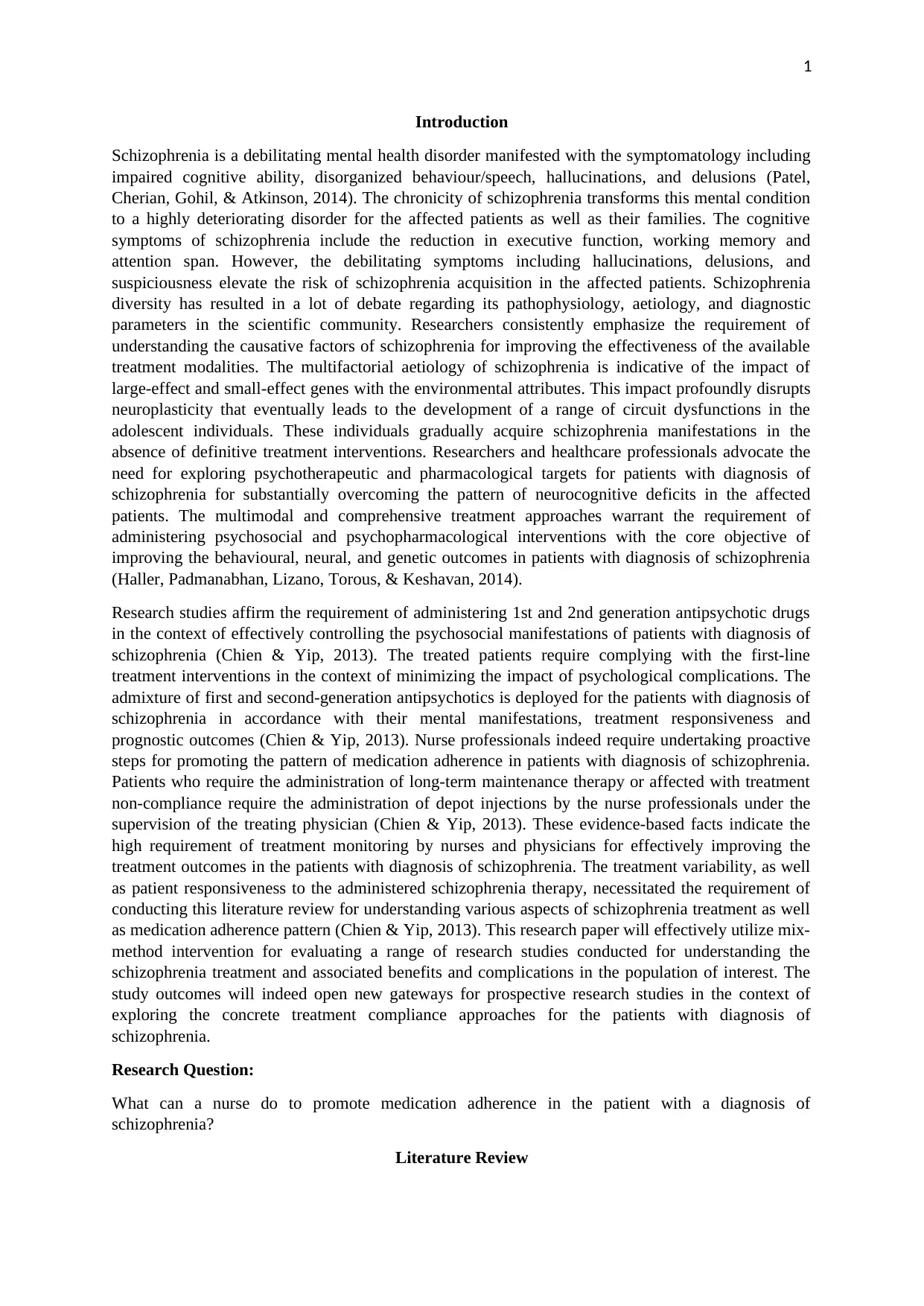
1
Introduction
Schizophrenia is a debilitating mental health disorder manifested with the symptomatology including
impaired cognitive ability, disorganized behaviour/speech, hallucinations, and delusions (Patel,
Cherian, Gohil, & Atkinson, 2014). The chronicity of schizophrenia transforms this mental condition
to a highly deteriorating disorder for the affected patients as well as their families. The cognitive
symptoms of schizophrenia include the reduction in executive function, working memory and
attention span. However, the debilitating symptoms including hallucinations, delusions, and
suspiciousness elevate the risk of schizophrenia acquisition in the affected patients. Schizophrenia
diversity has resulted in a lot of debate regarding its pathophysiology, aetiology, and diagnostic
parameters in the scientific community. Researchers consistently emphasize the requirement of
understanding the causative factors of schizophrenia for improving the effectiveness of the available
treatment modalities. The multifactorial aetiology of schizophrenia is indicative of the impact of
large-effect and small-effect genes with the environmental attributes. This impact profoundly disrupts
neuroplasticity that eventually leads to the development of a range of circuit dysfunctions in the
adolescent individuals. These individuals gradually acquire schizophrenia manifestations in the
absence of definitive treatment interventions. Researchers and healthcare professionals advocate the
need for exploring psychotherapeutic and pharmacological targets for patients with diagnosis of
schizophrenia for substantially overcoming the pattern of neurocognitive deficits in the affected
patients. The multimodal and comprehensive treatment approaches warrant the requirement of
administering psychosocial and psychopharmacological interventions with the core objective of
improving the behavioural, neural, and genetic outcomes in patients with diagnosis of schizophrenia
(Haller, Padmanabhan, Lizano, Torous, & Keshavan, 2014).
Research studies affirm the requirement of administering 1st and 2nd generation antipsychotic drugs
in the context of effectively controlling the psychosocial manifestations of patients with diagnosis of
schizophrenia (Chien & Yip, 2013). The treated patients require complying with the first-line
treatment interventions in the context of minimizing the impact of psychological complications. The
admixture of first and second-generation antipsychotics is deployed for the patients with diagnosis of
schizophrenia in accordance with their mental manifestations, treatment responsiveness and
prognostic outcomes (Chien & Yip, 2013). Nurse professionals indeed require undertaking proactive
steps for promoting the pattern of medication adherence in patients with diagnosis of schizophrenia.
Patients who require the administration of long-term maintenance therapy or affected with treatment
non-compliance require the administration of depot injections by the nurse professionals under the
supervision of the treating physician (Chien & Yip, 2013). These evidence-based facts indicate the
high requirement of treatment monitoring by nurses and physicians for effectively improving the
treatment outcomes in the patients with diagnosis of schizophrenia. The treatment variability, as well
as patient responsiveness to the administered schizophrenia therapy, necessitated the requirement of
conducting this literature review for understanding various aspects of schizophrenia treatment as well
as medication adherence pattern (Chien & Yip, 2013). This research paper will effectively utilize mix-
method intervention for evaluating a range of research studies conducted for understanding the
schizophrenia treatment and associated benefits and complications in the population of interest. The
study outcomes will indeed open new gateways for prospective research studies in the context of
exploring the concrete treatment compliance approaches for the patients with diagnosis of
schizophrenia.
Research Question:
What can a nurse do to promote medication adherence in the patient with a diagnosis of
schizophrenia?
Literature Review
Introduction
Schizophrenia is a debilitating mental health disorder manifested with the symptomatology including
impaired cognitive ability, disorganized behaviour/speech, hallucinations, and delusions (Patel,
Cherian, Gohil, & Atkinson, 2014). The chronicity of schizophrenia transforms this mental condition
to a highly deteriorating disorder for the affected patients as well as their families. The cognitive
symptoms of schizophrenia include the reduction in executive function, working memory and
attention span. However, the debilitating symptoms including hallucinations, delusions, and
suspiciousness elevate the risk of schizophrenia acquisition in the affected patients. Schizophrenia
diversity has resulted in a lot of debate regarding its pathophysiology, aetiology, and diagnostic
parameters in the scientific community. Researchers consistently emphasize the requirement of
understanding the causative factors of schizophrenia for improving the effectiveness of the available
treatment modalities. The multifactorial aetiology of schizophrenia is indicative of the impact of
large-effect and small-effect genes with the environmental attributes. This impact profoundly disrupts
neuroplasticity that eventually leads to the development of a range of circuit dysfunctions in the
adolescent individuals. These individuals gradually acquire schizophrenia manifestations in the
absence of definitive treatment interventions. Researchers and healthcare professionals advocate the
need for exploring psychotherapeutic and pharmacological targets for patients with diagnosis of
schizophrenia for substantially overcoming the pattern of neurocognitive deficits in the affected
patients. The multimodal and comprehensive treatment approaches warrant the requirement of
administering psychosocial and psychopharmacological interventions with the core objective of
improving the behavioural, neural, and genetic outcomes in patients with diagnosis of schizophrenia
(Haller, Padmanabhan, Lizano, Torous, & Keshavan, 2014).
Research studies affirm the requirement of administering 1st and 2nd generation antipsychotic drugs
in the context of effectively controlling the psychosocial manifestations of patients with diagnosis of
schizophrenia (Chien & Yip, 2013). The treated patients require complying with the first-line
treatment interventions in the context of minimizing the impact of psychological complications. The
admixture of first and second-generation antipsychotics is deployed for the patients with diagnosis of
schizophrenia in accordance with their mental manifestations, treatment responsiveness and
prognostic outcomes (Chien & Yip, 2013). Nurse professionals indeed require undertaking proactive
steps for promoting the pattern of medication adherence in patients with diagnosis of schizophrenia.
Patients who require the administration of long-term maintenance therapy or affected with treatment
non-compliance require the administration of depot injections by the nurse professionals under the
supervision of the treating physician (Chien & Yip, 2013). These evidence-based facts indicate the
high requirement of treatment monitoring by nurses and physicians for effectively improving the
treatment outcomes in the patients with diagnosis of schizophrenia. The treatment variability, as well
as patient responsiveness to the administered schizophrenia therapy, necessitated the requirement of
conducting this literature review for understanding various aspects of schizophrenia treatment as well
as medication adherence pattern (Chien & Yip, 2013). This research paper will effectively utilize mix-
method intervention for evaluating a range of research studies conducted for understanding the
schizophrenia treatment and associated benefits and complications in the population of interest. The
study outcomes will indeed open new gateways for prospective research studies in the context of
exploring the concrete treatment compliance approaches for the patients with diagnosis of
schizophrenia.
Research Question:
What can a nurse do to promote medication adherence in the patient with a diagnosis of
schizophrenia?
Literature Review
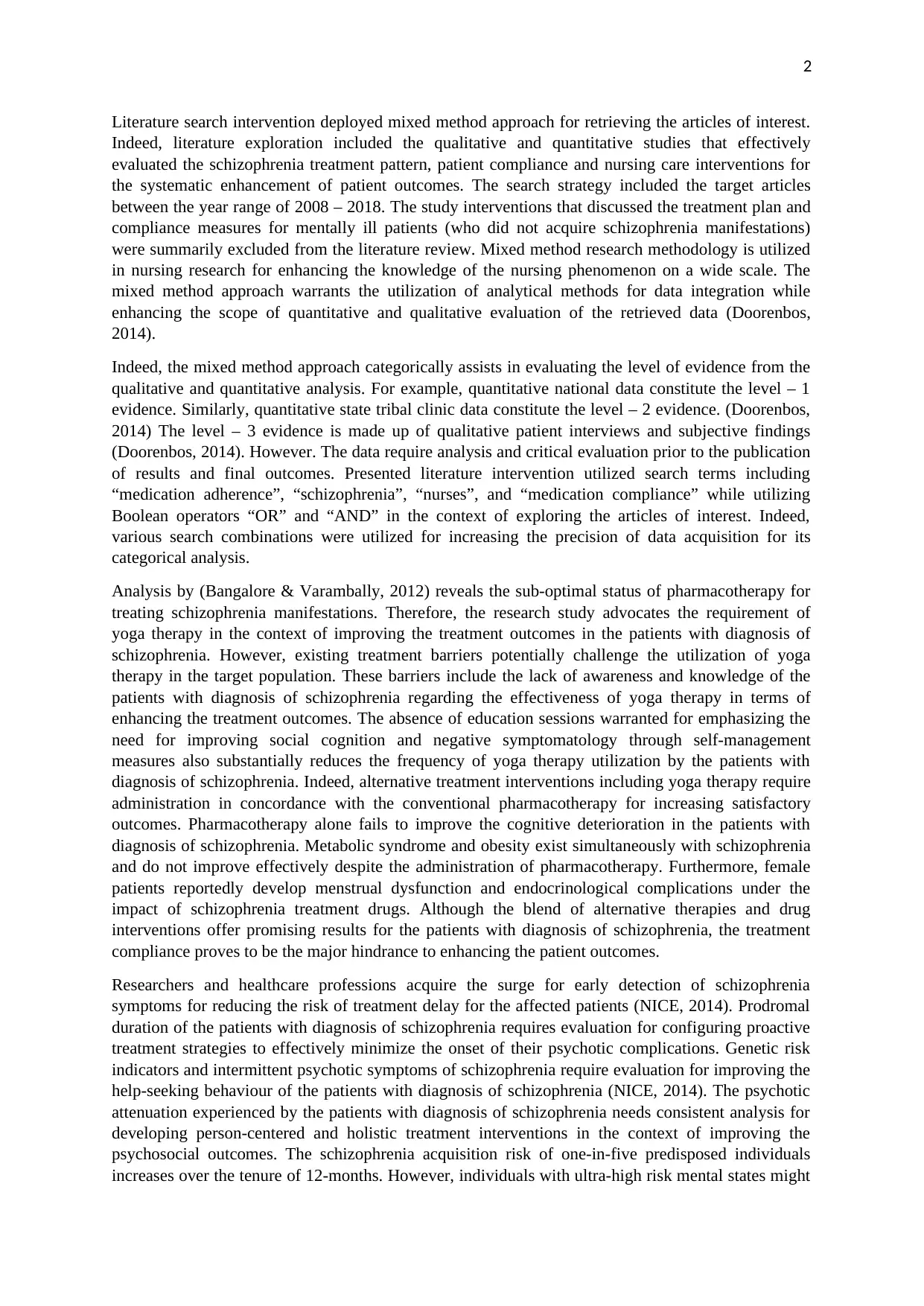
2
Literature search intervention deployed mixed method approach for retrieving the articles of interest.
Indeed, literature exploration included the qualitative and quantitative studies that effectively
evaluated the schizophrenia treatment pattern, patient compliance and nursing care interventions for
the systematic enhancement of patient outcomes. The search strategy included the target articles
between the year range of 2008 – 2018. The study interventions that discussed the treatment plan and
compliance measures for mentally ill patients (who did not acquire schizophrenia manifestations)
were summarily excluded from the literature review. Mixed method research methodology is utilized
in nursing research for enhancing the knowledge of the nursing phenomenon on a wide scale. The
mixed method approach warrants the utilization of analytical methods for data integration while
enhancing the scope of quantitative and qualitative evaluation of the retrieved data (Doorenbos,
2014).
Indeed, the mixed method approach categorically assists in evaluating the level of evidence from the
qualitative and quantitative analysis. For example, quantitative national data constitute the level – 1
evidence. Similarly, quantitative state tribal clinic data constitute the level – 2 evidence. (Doorenbos,
2014) The level – 3 evidence is made up of qualitative patient interviews and subjective findings
(Doorenbos, 2014). However. The data require analysis and critical evaluation prior to the publication
of results and final outcomes. Presented literature intervention utilized search terms including
“medication adherence”, “schizophrenia”, “nurses”, and “medication compliance” while utilizing
Boolean operators “OR” and “AND” in the context of exploring the articles of interest. Indeed,
various search combinations were utilized for increasing the precision of data acquisition for its
categorical analysis.
Analysis by (Bangalore & Varambally, 2012) reveals the sub-optimal status of pharmacotherapy for
treating schizophrenia manifestations. Therefore, the research study advocates the requirement of
yoga therapy in the context of improving the treatment outcomes in the patients with diagnosis of
schizophrenia. However, existing treatment barriers potentially challenge the utilization of yoga
therapy in the target population. These barriers include the lack of awareness and knowledge of the
patients with diagnosis of schizophrenia regarding the effectiveness of yoga therapy in terms of
enhancing the treatment outcomes. The absence of education sessions warranted for emphasizing the
need for improving social cognition and negative symptomatology through self-management
measures also substantially reduces the frequency of yoga therapy utilization by the patients with
diagnosis of schizophrenia. Indeed, alternative treatment interventions including yoga therapy require
administration in concordance with the conventional pharmacotherapy for increasing satisfactory
outcomes. Pharmacotherapy alone fails to improve the cognitive deterioration in the patients with
diagnosis of schizophrenia. Metabolic syndrome and obesity exist simultaneously with schizophrenia
and do not improve effectively despite the administration of pharmacotherapy. Furthermore, female
patients reportedly develop menstrual dysfunction and endocrinological complications under the
impact of schizophrenia treatment drugs. Although the blend of alternative therapies and drug
interventions offer promising results for the patients with diagnosis of schizophrenia, the treatment
compliance proves to be the major hindrance to enhancing the patient outcomes.
Researchers and healthcare professions acquire the surge for early detection of schizophrenia
symptoms for reducing the risk of treatment delay for the affected patients (NICE, 2014). Prodromal
duration of the patients with diagnosis of schizophrenia requires evaluation for configuring proactive
treatment strategies to effectively minimize the onset of their psychotic complications. Genetic risk
indicators and intermittent psychotic symptoms of schizophrenia require evaluation for improving the
help-seeking behaviour of the patients with diagnosis of schizophrenia (NICE, 2014). The psychotic
attenuation experienced by the patients with diagnosis of schizophrenia needs consistent analysis for
developing person-centered and holistic treatment interventions in the context of improving the
psychosocial outcomes. The schizophrenia acquisition risk of one-in-five predisposed individuals
increases over the tenure of 12-months. However, individuals with ultra-high risk mental states might
Literature search intervention deployed mixed method approach for retrieving the articles of interest.
Indeed, literature exploration included the qualitative and quantitative studies that effectively
evaluated the schizophrenia treatment pattern, patient compliance and nursing care interventions for
the systematic enhancement of patient outcomes. The search strategy included the target articles
between the year range of 2008 – 2018. The study interventions that discussed the treatment plan and
compliance measures for mentally ill patients (who did not acquire schizophrenia manifestations)
were summarily excluded from the literature review. Mixed method research methodology is utilized
in nursing research for enhancing the knowledge of the nursing phenomenon on a wide scale. The
mixed method approach warrants the utilization of analytical methods for data integration while
enhancing the scope of quantitative and qualitative evaluation of the retrieved data (Doorenbos,
2014).
Indeed, the mixed method approach categorically assists in evaluating the level of evidence from the
qualitative and quantitative analysis. For example, quantitative national data constitute the level – 1
evidence. Similarly, quantitative state tribal clinic data constitute the level – 2 evidence. (Doorenbos,
2014) The level – 3 evidence is made up of qualitative patient interviews and subjective findings
(Doorenbos, 2014). However. The data require analysis and critical evaluation prior to the publication
of results and final outcomes. Presented literature intervention utilized search terms including
“medication adherence”, “schizophrenia”, “nurses”, and “medication compliance” while utilizing
Boolean operators “OR” and “AND” in the context of exploring the articles of interest. Indeed,
various search combinations were utilized for increasing the precision of data acquisition for its
categorical analysis.
Analysis by (Bangalore & Varambally, 2012) reveals the sub-optimal status of pharmacotherapy for
treating schizophrenia manifestations. Therefore, the research study advocates the requirement of
yoga therapy in the context of improving the treatment outcomes in the patients with diagnosis of
schizophrenia. However, existing treatment barriers potentially challenge the utilization of yoga
therapy in the target population. These barriers include the lack of awareness and knowledge of the
patients with diagnosis of schizophrenia regarding the effectiveness of yoga therapy in terms of
enhancing the treatment outcomes. The absence of education sessions warranted for emphasizing the
need for improving social cognition and negative symptomatology through self-management
measures also substantially reduces the frequency of yoga therapy utilization by the patients with
diagnosis of schizophrenia. Indeed, alternative treatment interventions including yoga therapy require
administration in concordance with the conventional pharmacotherapy for increasing satisfactory
outcomes. Pharmacotherapy alone fails to improve the cognitive deterioration in the patients with
diagnosis of schizophrenia. Metabolic syndrome and obesity exist simultaneously with schizophrenia
and do not improve effectively despite the administration of pharmacotherapy. Furthermore, female
patients reportedly develop menstrual dysfunction and endocrinological complications under the
impact of schizophrenia treatment drugs. Although the blend of alternative therapies and drug
interventions offer promising results for the patients with diagnosis of schizophrenia, the treatment
compliance proves to be the major hindrance to enhancing the patient outcomes.
Researchers and healthcare professions acquire the surge for early detection of schizophrenia
symptoms for reducing the risk of treatment delay for the affected patients (NICE, 2014). Prodromal
duration of the patients with diagnosis of schizophrenia requires evaluation for configuring proactive
treatment strategies to effectively minimize the onset of their psychotic complications. Genetic risk
indicators and intermittent psychotic symptoms of schizophrenia require evaluation for improving the
help-seeking behaviour of the patients with diagnosis of schizophrenia (NICE, 2014). The psychotic
attenuation experienced by the patients with diagnosis of schizophrenia needs consistent analysis for
developing person-centered and holistic treatment interventions in the context of improving the
psychosocial outcomes. The schizophrenia acquisition risk of one-in-five predisposed individuals
increases over the tenure of 12-months. However, individuals with ultra-high risk mental states might
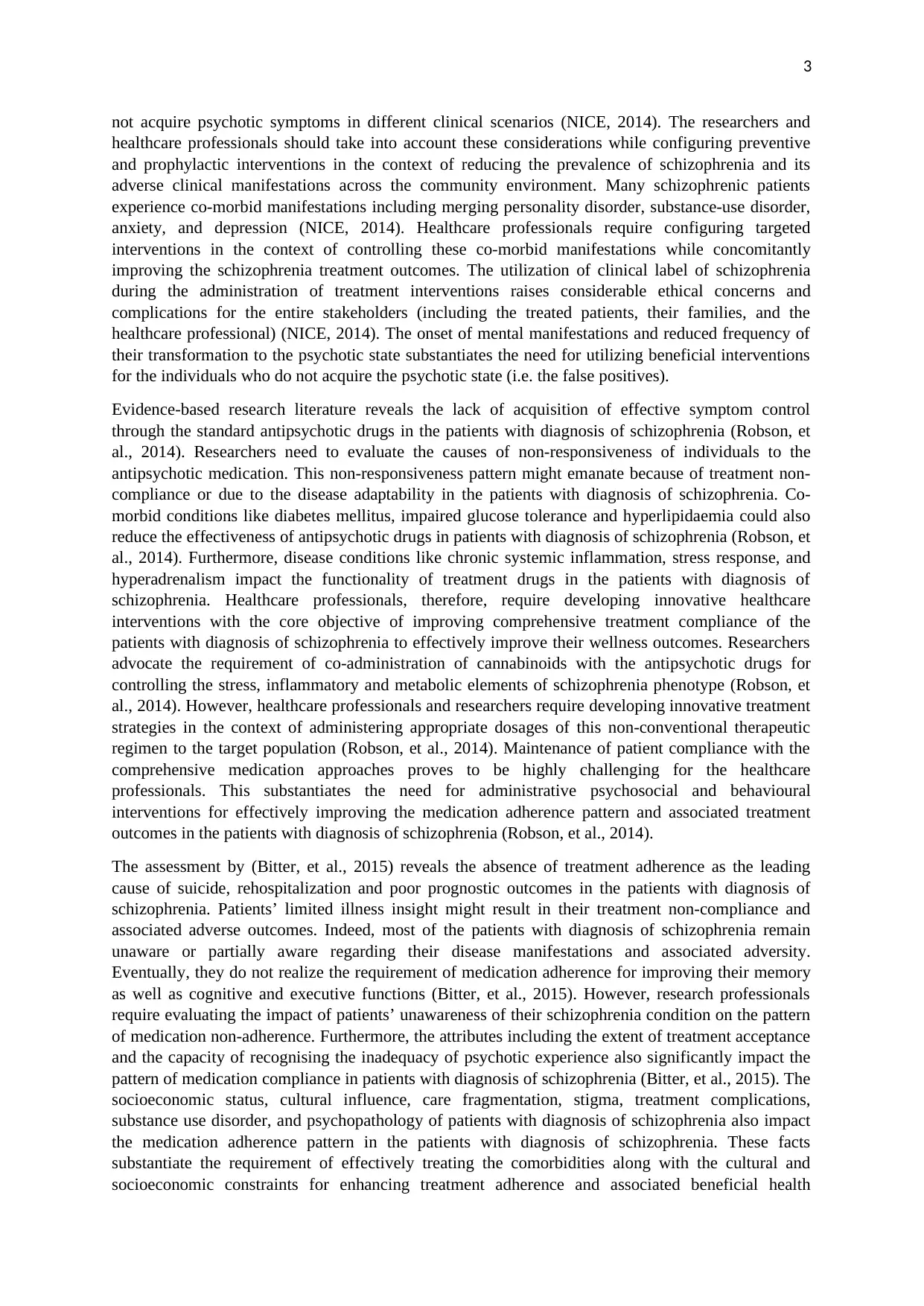
3
not acquire psychotic symptoms in different clinical scenarios (NICE, 2014). The researchers and
healthcare professionals should take into account these considerations while configuring preventive
and prophylactic interventions in the context of reducing the prevalence of schizophrenia and its
adverse clinical manifestations across the community environment. Many schizophrenic patients
experience co-morbid manifestations including merging personality disorder, substance-use disorder,
anxiety, and depression (NICE, 2014). Healthcare professionals require configuring targeted
interventions in the context of controlling these co-morbid manifestations while concomitantly
improving the schizophrenia treatment outcomes. The utilization of clinical label of schizophrenia
during the administration of treatment interventions raises considerable ethical concerns and
complications for the entire stakeholders (including the treated patients, their families, and the
healthcare professional) (NICE, 2014). The onset of mental manifestations and reduced frequency of
their transformation to the psychotic state substantiates the need for utilizing beneficial interventions
for the individuals who do not acquire the psychotic state (i.e. the false positives).
Evidence-based research literature reveals the lack of acquisition of effective symptom control
through the standard antipsychotic drugs in the patients with diagnosis of schizophrenia (Robson, et
al., 2014). Researchers need to evaluate the causes of non-responsiveness of individuals to the
antipsychotic medication. This non-responsiveness pattern might emanate because of treatment non-
compliance or due to the disease adaptability in the patients with diagnosis of schizophrenia. Co-
morbid conditions like diabetes mellitus, impaired glucose tolerance and hyperlipidaemia could also
reduce the effectiveness of antipsychotic drugs in patients with diagnosis of schizophrenia (Robson, et
al., 2014). Furthermore, disease conditions like chronic systemic inflammation, stress response, and
hyperadrenalism impact the functionality of treatment drugs in the patients with diagnosis of
schizophrenia. Healthcare professionals, therefore, require developing innovative healthcare
interventions with the core objective of improving comprehensive treatment compliance of the
patients with diagnosis of schizophrenia to effectively improve their wellness outcomes. Researchers
advocate the requirement of co-administration of cannabinoids with the antipsychotic drugs for
controlling the stress, inflammatory and metabolic elements of schizophrenia phenotype (Robson, et
al., 2014). However, healthcare professionals and researchers require developing innovative treatment
strategies in the context of administering appropriate dosages of this non-conventional therapeutic
regimen to the target population (Robson, et al., 2014). Maintenance of patient compliance with the
comprehensive medication approaches proves to be highly challenging for the healthcare
professionals. This substantiates the need for administrative psychosocial and behavioural
interventions for effectively improving the medication adherence pattern and associated treatment
outcomes in the patients with diagnosis of schizophrenia (Robson, et al., 2014).
The assessment by (Bitter, et al., 2015) reveals the absence of treatment adherence as the leading
cause of suicide, rehospitalization and poor prognostic outcomes in the patients with diagnosis of
schizophrenia. Patients’ limited illness insight might result in their treatment non-compliance and
associated adverse outcomes. Indeed, most of the patients with diagnosis of schizophrenia remain
unaware or partially aware regarding their disease manifestations and associated adversity.
Eventually, they do not realize the requirement of medication adherence for improving their memory
as well as cognitive and executive functions (Bitter, et al., 2015). However, research professionals
require evaluating the impact of patients’ unawareness of their schizophrenia condition on the pattern
of medication non-adherence. Furthermore, the attributes including the extent of treatment acceptance
and the capacity of recognising the inadequacy of psychotic experience also significantly impact the
pattern of medication compliance in patients with diagnosis of schizophrenia (Bitter, et al., 2015). The
socioeconomic status, cultural influence, care fragmentation, stigma, treatment complications,
substance use disorder, and psychopathology of patients with diagnosis of schizophrenia also impact
the medication adherence pattern in the patients with diagnosis of schizophrenia. These facts
substantiate the requirement of effectively treating the comorbidities along with the cultural and
socioeconomic constraints for enhancing treatment adherence and associated beneficial health
not acquire psychotic symptoms in different clinical scenarios (NICE, 2014). The researchers and
healthcare professionals should take into account these considerations while configuring preventive
and prophylactic interventions in the context of reducing the prevalence of schizophrenia and its
adverse clinical manifestations across the community environment. Many schizophrenic patients
experience co-morbid manifestations including merging personality disorder, substance-use disorder,
anxiety, and depression (NICE, 2014). Healthcare professionals require configuring targeted
interventions in the context of controlling these co-morbid manifestations while concomitantly
improving the schizophrenia treatment outcomes. The utilization of clinical label of schizophrenia
during the administration of treatment interventions raises considerable ethical concerns and
complications for the entire stakeholders (including the treated patients, their families, and the
healthcare professional) (NICE, 2014). The onset of mental manifestations and reduced frequency of
their transformation to the psychotic state substantiates the need for utilizing beneficial interventions
for the individuals who do not acquire the psychotic state (i.e. the false positives).
Evidence-based research literature reveals the lack of acquisition of effective symptom control
through the standard antipsychotic drugs in the patients with diagnosis of schizophrenia (Robson, et
al., 2014). Researchers need to evaluate the causes of non-responsiveness of individuals to the
antipsychotic medication. This non-responsiveness pattern might emanate because of treatment non-
compliance or due to the disease adaptability in the patients with diagnosis of schizophrenia. Co-
morbid conditions like diabetes mellitus, impaired glucose tolerance and hyperlipidaemia could also
reduce the effectiveness of antipsychotic drugs in patients with diagnosis of schizophrenia (Robson, et
al., 2014). Furthermore, disease conditions like chronic systemic inflammation, stress response, and
hyperadrenalism impact the functionality of treatment drugs in the patients with diagnosis of
schizophrenia. Healthcare professionals, therefore, require developing innovative healthcare
interventions with the core objective of improving comprehensive treatment compliance of the
patients with diagnosis of schizophrenia to effectively improve their wellness outcomes. Researchers
advocate the requirement of co-administration of cannabinoids with the antipsychotic drugs for
controlling the stress, inflammatory and metabolic elements of schizophrenia phenotype (Robson, et
al., 2014). However, healthcare professionals and researchers require developing innovative treatment
strategies in the context of administering appropriate dosages of this non-conventional therapeutic
regimen to the target population (Robson, et al., 2014). Maintenance of patient compliance with the
comprehensive medication approaches proves to be highly challenging for the healthcare
professionals. This substantiates the need for administrative psychosocial and behavioural
interventions for effectively improving the medication adherence pattern and associated treatment
outcomes in the patients with diagnosis of schizophrenia (Robson, et al., 2014).
The assessment by (Bitter, et al., 2015) reveals the absence of treatment adherence as the leading
cause of suicide, rehospitalization and poor prognostic outcomes in the patients with diagnosis of
schizophrenia. Patients’ limited illness insight might result in their treatment non-compliance and
associated adverse outcomes. Indeed, most of the patients with diagnosis of schizophrenia remain
unaware or partially aware regarding their disease manifestations and associated adversity.
Eventually, they do not realize the requirement of medication adherence for improving their memory
as well as cognitive and executive functions (Bitter, et al., 2015). However, research professionals
require evaluating the impact of patients’ unawareness of their schizophrenia condition on the pattern
of medication non-adherence. Furthermore, the attributes including the extent of treatment acceptance
and the capacity of recognising the inadequacy of psychotic experience also significantly impact the
pattern of medication compliance in patients with diagnosis of schizophrenia (Bitter, et al., 2015). The
socioeconomic status, cultural influence, care fragmentation, stigma, treatment complications,
substance use disorder, and psychopathology of patients with diagnosis of schizophrenia also impact
the medication adherence pattern in the patients with diagnosis of schizophrenia. These facts
substantiate the requirement of effectively treating the comorbidities along with the cultural and
socioeconomic constraints for enhancing treatment adherence and associated beneficial health
Secure Best Marks with AI Grader
Need help grading? Try our AI Grader for instant feedback on your assignments.
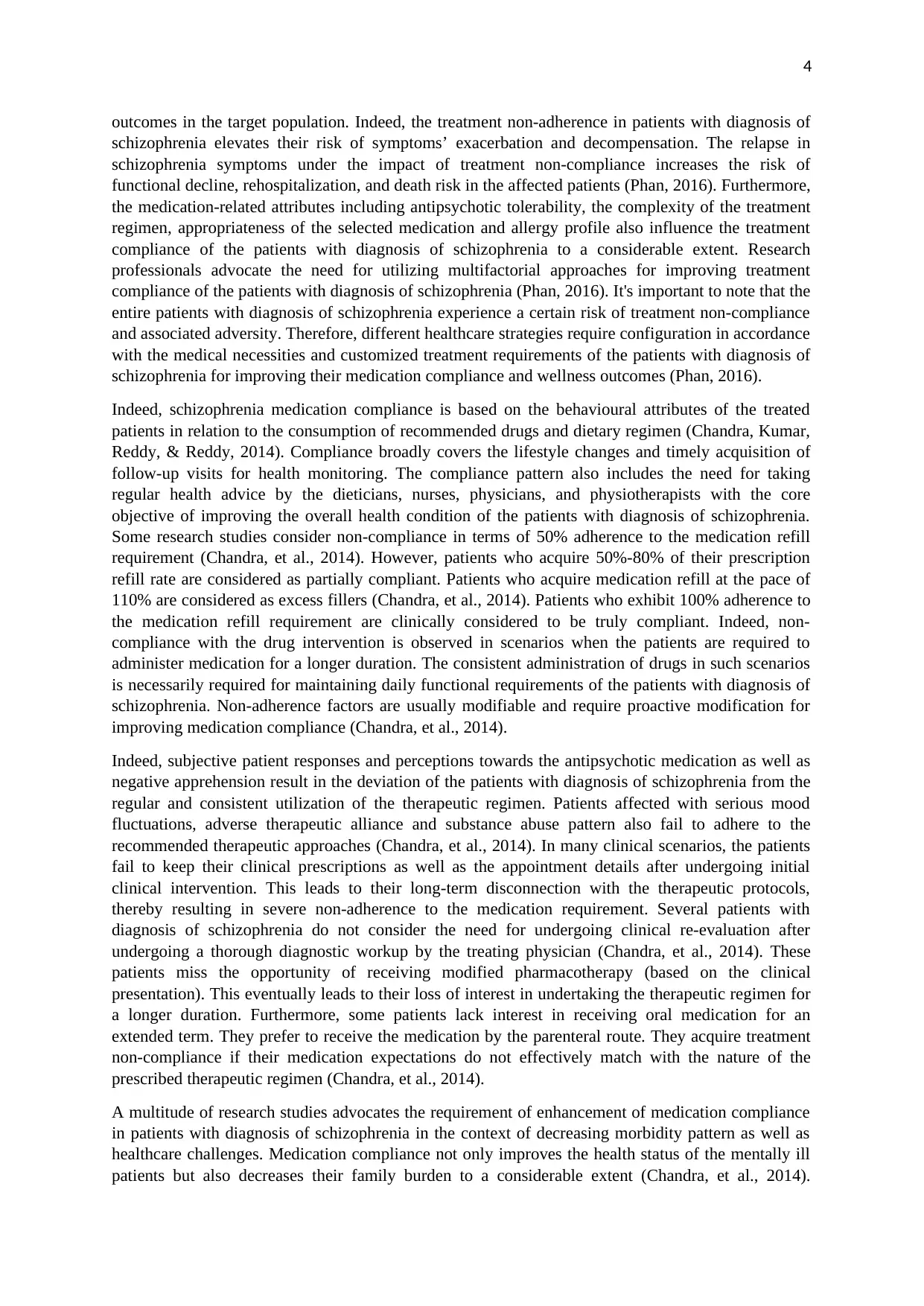
4
outcomes in the target population. Indeed, the treatment non-adherence in patients with diagnosis of
schizophrenia elevates their risk of symptoms’ exacerbation and decompensation. The relapse in
schizophrenia symptoms under the impact of treatment non-compliance increases the risk of
functional decline, rehospitalization, and death risk in the affected patients (Phan, 2016). Furthermore,
the medication-related attributes including antipsychotic tolerability, the complexity of the treatment
regimen, appropriateness of the selected medication and allergy profile also influence the treatment
compliance of the patients with diagnosis of schizophrenia to a considerable extent. Research
professionals advocate the need for utilizing multifactorial approaches for improving treatment
compliance of the patients with diagnosis of schizophrenia (Phan, 2016). It's important to note that the
entire patients with diagnosis of schizophrenia experience a certain risk of treatment non-compliance
and associated adversity. Therefore, different healthcare strategies require configuration in accordance
with the medical necessities and customized treatment requirements of the patients with diagnosis of
schizophrenia for improving their medication compliance and wellness outcomes (Phan, 2016).
Indeed, schizophrenia medication compliance is based on the behavioural attributes of the treated
patients in relation to the consumption of recommended drugs and dietary regimen (Chandra, Kumar,
Reddy, & Reddy, 2014). Compliance broadly covers the lifestyle changes and timely acquisition of
follow-up visits for health monitoring. The compliance pattern also includes the need for taking
regular health advice by the dieticians, nurses, physicians, and physiotherapists with the core
objective of improving the overall health condition of the patients with diagnosis of schizophrenia.
Some research studies consider non-compliance in terms of 50% adherence to the medication refill
requirement (Chandra, et al., 2014). However, patients who acquire 50%-80% of their prescription
refill rate are considered as partially compliant. Patients who acquire medication refill at the pace of
110% are considered as excess fillers (Chandra, et al., 2014). Patients who exhibit 100% adherence to
the medication refill requirement are clinically considered to be truly compliant. Indeed, non-
compliance with the drug intervention is observed in scenarios when the patients are required to
administer medication for a longer duration. The consistent administration of drugs in such scenarios
is necessarily required for maintaining daily functional requirements of the patients with diagnosis of
schizophrenia. Non-adherence factors are usually modifiable and require proactive modification for
improving medication compliance (Chandra, et al., 2014).
Indeed, subjective patient responses and perceptions towards the antipsychotic medication as well as
negative apprehension result in the deviation of the patients with diagnosis of schizophrenia from the
regular and consistent utilization of the therapeutic regimen. Patients affected with serious mood
fluctuations, adverse therapeutic alliance and substance abuse pattern also fail to adhere to the
recommended therapeutic approaches (Chandra, et al., 2014). In many clinical scenarios, the patients
fail to keep their clinical prescriptions as well as the appointment details after undergoing initial
clinical intervention. This leads to their long-term disconnection with the therapeutic protocols,
thereby resulting in severe non-adherence to the medication requirement. Several patients with
diagnosis of schizophrenia do not consider the need for undergoing clinical re-evaluation after
undergoing a thorough diagnostic workup by the treating physician (Chandra, et al., 2014). These
patients miss the opportunity of receiving modified pharmacotherapy (based on the clinical
presentation). This eventually leads to their loss of interest in undertaking the therapeutic regimen for
a longer duration. Furthermore, some patients lack interest in receiving oral medication for an
extended term. They prefer to receive the medication by the parenteral route. They acquire treatment
non-compliance if their medication expectations do not effectively match with the nature of the
prescribed therapeutic regimen (Chandra, et al., 2014).
A multitude of research studies advocates the requirement of enhancement of medication compliance
in patients with diagnosis of schizophrenia in the context of decreasing morbidity pattern as well as
healthcare challenges. Medication compliance not only improves the health status of the mentally ill
patients but also decreases their family burden to a considerable extent (Chandra, et al., 2014).
outcomes in the target population. Indeed, the treatment non-adherence in patients with diagnosis of
schizophrenia elevates their risk of symptoms’ exacerbation and decompensation. The relapse in
schizophrenia symptoms under the impact of treatment non-compliance increases the risk of
functional decline, rehospitalization, and death risk in the affected patients (Phan, 2016). Furthermore,
the medication-related attributes including antipsychotic tolerability, the complexity of the treatment
regimen, appropriateness of the selected medication and allergy profile also influence the treatment
compliance of the patients with diagnosis of schizophrenia to a considerable extent. Research
professionals advocate the need for utilizing multifactorial approaches for improving treatment
compliance of the patients with diagnosis of schizophrenia (Phan, 2016). It's important to note that the
entire patients with diagnosis of schizophrenia experience a certain risk of treatment non-compliance
and associated adversity. Therefore, different healthcare strategies require configuration in accordance
with the medical necessities and customized treatment requirements of the patients with diagnosis of
schizophrenia for improving their medication compliance and wellness outcomes (Phan, 2016).
Indeed, schizophrenia medication compliance is based on the behavioural attributes of the treated
patients in relation to the consumption of recommended drugs and dietary regimen (Chandra, Kumar,
Reddy, & Reddy, 2014). Compliance broadly covers the lifestyle changes and timely acquisition of
follow-up visits for health monitoring. The compliance pattern also includes the need for taking
regular health advice by the dieticians, nurses, physicians, and physiotherapists with the core
objective of improving the overall health condition of the patients with diagnosis of schizophrenia.
Some research studies consider non-compliance in terms of 50% adherence to the medication refill
requirement (Chandra, et al., 2014). However, patients who acquire 50%-80% of their prescription
refill rate are considered as partially compliant. Patients who acquire medication refill at the pace of
110% are considered as excess fillers (Chandra, et al., 2014). Patients who exhibit 100% adherence to
the medication refill requirement are clinically considered to be truly compliant. Indeed, non-
compliance with the drug intervention is observed in scenarios when the patients are required to
administer medication for a longer duration. The consistent administration of drugs in such scenarios
is necessarily required for maintaining daily functional requirements of the patients with diagnosis of
schizophrenia. Non-adherence factors are usually modifiable and require proactive modification for
improving medication compliance (Chandra, et al., 2014).
Indeed, subjective patient responses and perceptions towards the antipsychotic medication as well as
negative apprehension result in the deviation of the patients with diagnosis of schizophrenia from the
regular and consistent utilization of the therapeutic regimen. Patients affected with serious mood
fluctuations, adverse therapeutic alliance and substance abuse pattern also fail to adhere to the
recommended therapeutic approaches (Chandra, et al., 2014). In many clinical scenarios, the patients
fail to keep their clinical prescriptions as well as the appointment details after undergoing initial
clinical intervention. This leads to their long-term disconnection with the therapeutic protocols,
thereby resulting in severe non-adherence to the medication requirement. Several patients with
diagnosis of schizophrenia do not consider the need for undergoing clinical re-evaluation after
undergoing a thorough diagnostic workup by the treating physician (Chandra, et al., 2014). These
patients miss the opportunity of receiving modified pharmacotherapy (based on the clinical
presentation). This eventually leads to their loss of interest in undertaking the therapeutic regimen for
a longer duration. Furthermore, some patients lack interest in receiving oral medication for an
extended term. They prefer to receive the medication by the parenteral route. They acquire treatment
non-compliance if their medication expectations do not effectively match with the nature of the
prescribed therapeutic regimen (Chandra, et al., 2014).
A multitude of research studies advocates the requirement of enhancement of medication compliance
in patients with diagnosis of schizophrenia in the context of decreasing morbidity pattern as well as
healthcare challenges. Medication compliance not only improves the health status of the mentally ill
patients but also decreases their family burden to a considerable extent (Chandra, et al., 2014).
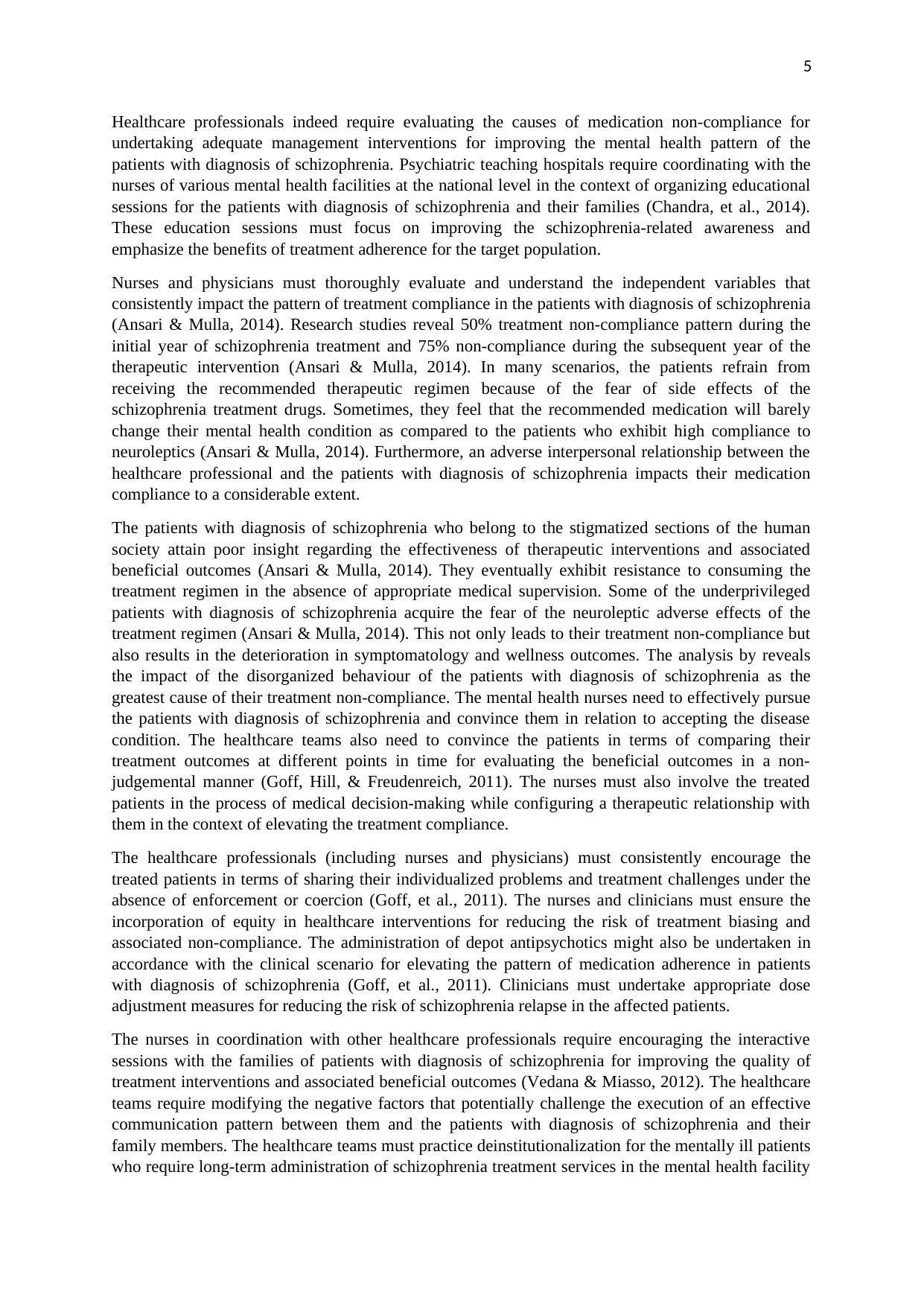
5
Healthcare professionals indeed require evaluating the causes of medication non-compliance for
undertaking adequate management interventions for improving the mental health pattern of the
patients with diagnosis of schizophrenia. Psychiatric teaching hospitals require coordinating with the
nurses of various mental health facilities at the national level in the context of organizing educational
sessions for the patients with diagnosis of schizophrenia and their families (Chandra, et al., 2014).
These education sessions must focus on improving the schizophrenia-related awareness and
emphasize the benefits of treatment adherence for the target population.
Nurses and physicians must thoroughly evaluate and understand the independent variables that
consistently impact the pattern of treatment compliance in the patients with diagnosis of schizophrenia
(Ansari & Mulla, 2014). Research studies reveal 50% treatment non-compliance pattern during the
initial year of schizophrenia treatment and 75% non-compliance during the subsequent year of the
therapeutic intervention (Ansari & Mulla, 2014). In many scenarios, the patients refrain from
receiving the recommended therapeutic regimen because of the fear of side effects of the
schizophrenia treatment drugs. Sometimes, they feel that the recommended medication will barely
change their mental health condition as compared to the patients who exhibit high compliance to
neuroleptics (Ansari & Mulla, 2014). Furthermore, an adverse interpersonal relationship between the
healthcare professional and the patients with diagnosis of schizophrenia impacts their medication
compliance to a considerable extent.
The patients with diagnosis of schizophrenia who belong to the stigmatized sections of the human
society attain poor insight regarding the effectiveness of therapeutic interventions and associated
beneficial outcomes (Ansari & Mulla, 2014). They eventually exhibit resistance to consuming the
treatment regimen in the absence of appropriate medical supervision. Some of the underprivileged
patients with diagnosis of schizophrenia acquire the fear of the neuroleptic adverse effects of the
treatment regimen (Ansari & Mulla, 2014). This not only leads to their treatment non-compliance but
also results in the deterioration in symptomatology and wellness outcomes. The analysis by reveals
the impact of the disorganized behaviour of the patients with diagnosis of schizophrenia as the
greatest cause of their treatment non-compliance. The mental health nurses need to effectively pursue
the patients with diagnosis of schizophrenia and convince them in relation to accepting the disease
condition. The healthcare teams also need to convince the patients in terms of comparing their
treatment outcomes at different points in time for evaluating the beneficial outcomes in a non-
judgemental manner (Goff, Hill, & Freudenreich, 2011). The nurses must also involve the treated
patients in the process of medical decision-making while configuring a therapeutic relationship with
them in the context of elevating the treatment compliance.
The healthcare professionals (including nurses and physicians) must consistently encourage the
treated patients in terms of sharing their individualized problems and treatment challenges under the
absence of enforcement or coercion (Goff, et al., 2011). The nurses and clinicians must ensure the
incorporation of equity in healthcare interventions for reducing the risk of treatment biasing and
associated non-compliance. The administration of depot antipsychotics might also be undertaken in
accordance with the clinical scenario for elevating the pattern of medication adherence in patients
with diagnosis of schizophrenia (Goff, et al., 2011). Clinicians must undertake appropriate dose
adjustment measures for reducing the risk of schizophrenia relapse in the affected patients.
The nurses in coordination with other healthcare professionals require encouraging the interactive
sessions with the families of patients with diagnosis of schizophrenia for improving the quality of
treatment interventions and associated beneficial outcomes (Vedana & Miasso, 2012). The healthcare
teams require modifying the negative factors that potentially challenge the execution of an effective
communication pattern between them and the patients with diagnosis of schizophrenia and their
family members. The healthcare teams must practice deinstitutionalization for the mentally ill patients
who require long-term administration of schizophrenia treatment services in the mental health facility
Healthcare professionals indeed require evaluating the causes of medication non-compliance for
undertaking adequate management interventions for improving the mental health pattern of the
patients with diagnosis of schizophrenia. Psychiatric teaching hospitals require coordinating with the
nurses of various mental health facilities at the national level in the context of organizing educational
sessions for the patients with diagnosis of schizophrenia and their families (Chandra, et al., 2014).
These education sessions must focus on improving the schizophrenia-related awareness and
emphasize the benefits of treatment adherence for the target population.
Nurses and physicians must thoroughly evaluate and understand the independent variables that
consistently impact the pattern of treatment compliance in the patients with diagnosis of schizophrenia
(Ansari & Mulla, 2014). Research studies reveal 50% treatment non-compliance pattern during the
initial year of schizophrenia treatment and 75% non-compliance during the subsequent year of the
therapeutic intervention (Ansari & Mulla, 2014). In many scenarios, the patients refrain from
receiving the recommended therapeutic regimen because of the fear of side effects of the
schizophrenia treatment drugs. Sometimes, they feel that the recommended medication will barely
change their mental health condition as compared to the patients who exhibit high compliance to
neuroleptics (Ansari & Mulla, 2014). Furthermore, an adverse interpersonal relationship between the
healthcare professional and the patients with diagnosis of schizophrenia impacts their medication
compliance to a considerable extent.
The patients with diagnosis of schizophrenia who belong to the stigmatized sections of the human
society attain poor insight regarding the effectiveness of therapeutic interventions and associated
beneficial outcomes (Ansari & Mulla, 2014). They eventually exhibit resistance to consuming the
treatment regimen in the absence of appropriate medical supervision. Some of the underprivileged
patients with diagnosis of schizophrenia acquire the fear of the neuroleptic adverse effects of the
treatment regimen (Ansari & Mulla, 2014). This not only leads to their treatment non-compliance but
also results in the deterioration in symptomatology and wellness outcomes. The analysis by reveals
the impact of the disorganized behaviour of the patients with diagnosis of schizophrenia as the
greatest cause of their treatment non-compliance. The mental health nurses need to effectively pursue
the patients with diagnosis of schizophrenia and convince them in relation to accepting the disease
condition. The healthcare teams also need to convince the patients in terms of comparing their
treatment outcomes at different points in time for evaluating the beneficial outcomes in a non-
judgemental manner (Goff, Hill, & Freudenreich, 2011). The nurses must also involve the treated
patients in the process of medical decision-making while configuring a therapeutic relationship with
them in the context of elevating the treatment compliance.
The healthcare professionals (including nurses and physicians) must consistently encourage the
treated patients in terms of sharing their individualized problems and treatment challenges under the
absence of enforcement or coercion (Goff, et al., 2011). The nurses and clinicians must ensure the
incorporation of equity in healthcare interventions for reducing the risk of treatment biasing and
associated non-compliance. The administration of depot antipsychotics might also be undertaken in
accordance with the clinical scenario for elevating the pattern of medication adherence in patients
with diagnosis of schizophrenia (Goff, et al., 2011). Clinicians must undertake appropriate dose
adjustment measures for reducing the risk of schizophrenia relapse in the affected patients.
The nurses in coordination with other healthcare professionals require encouraging the interactive
sessions with the families of patients with diagnosis of schizophrenia for improving the quality of
treatment interventions and associated beneficial outcomes (Vedana & Miasso, 2012). The healthcare
teams require modifying the negative factors that potentially challenge the execution of an effective
communication pattern between them and the patients with diagnosis of schizophrenia and their
family members. The healthcare teams must practice deinstitutionalization for the mentally ill patients
who require long-term administration of schizophrenia treatment services in the mental health facility
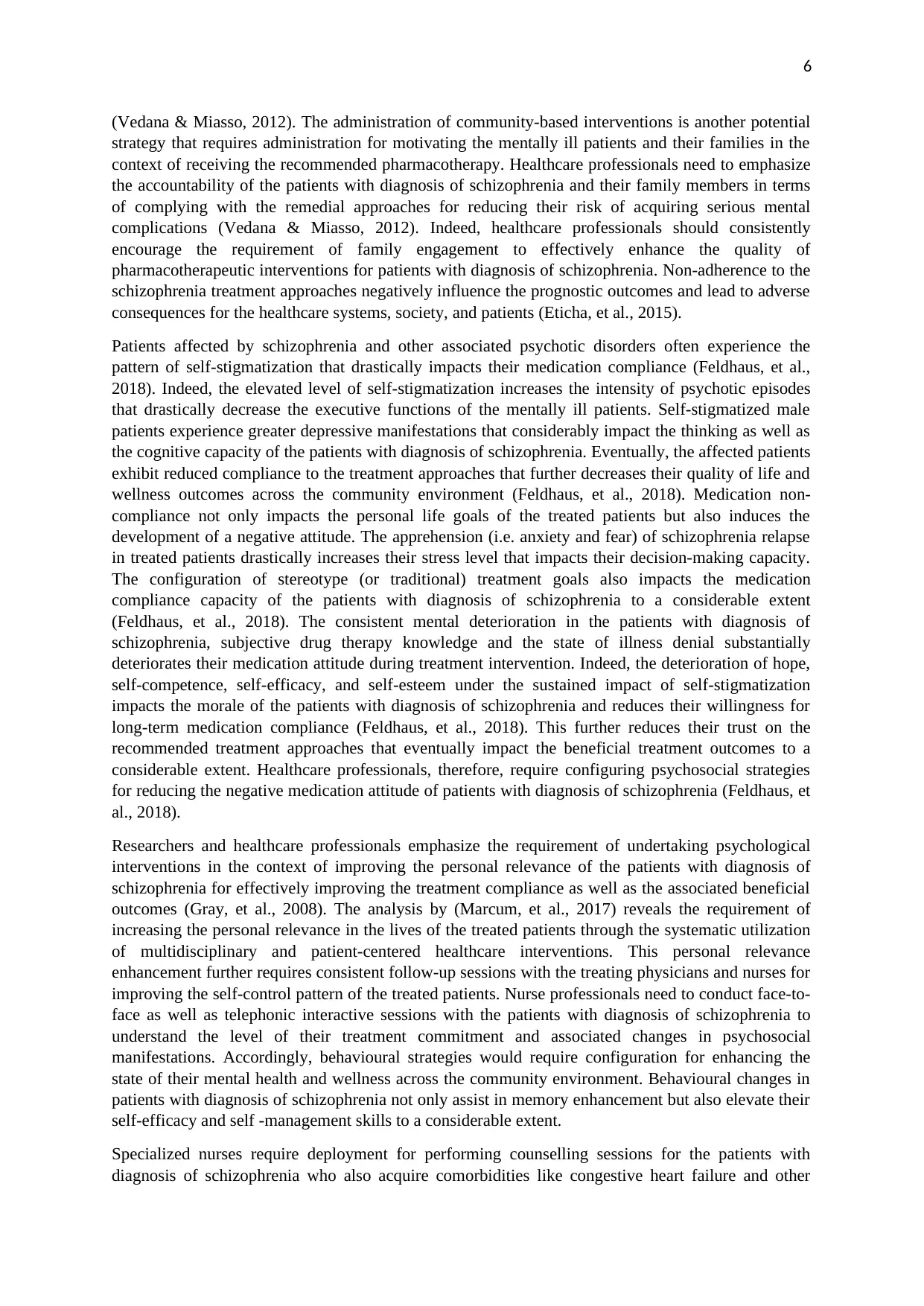
6
(Vedana & Miasso, 2012). The administration of community-based interventions is another potential
strategy that requires administration for motivating the mentally ill patients and their families in the
context of receiving the recommended pharmacotherapy. Healthcare professionals need to emphasize
the accountability of the patients with diagnosis of schizophrenia and their family members in terms
of complying with the remedial approaches for reducing their risk of acquiring serious mental
complications (Vedana & Miasso, 2012). Indeed, healthcare professionals should consistently
encourage the requirement of family engagement to effectively enhance the quality of
pharmacotherapeutic interventions for patients with diagnosis of schizophrenia. Non-adherence to the
schizophrenia treatment approaches negatively influence the prognostic outcomes and lead to adverse
consequences for the healthcare systems, society, and patients (Eticha, et al., 2015).
Patients affected by schizophrenia and other associated psychotic disorders often experience the
pattern of self-stigmatization that drastically impacts their medication compliance (Feldhaus, et al.,
2018). Indeed, the elevated level of self-stigmatization increases the intensity of psychotic episodes
that drastically decrease the executive functions of the mentally ill patients. Self-stigmatized male
patients experience greater depressive manifestations that considerably impact the thinking as well as
the cognitive capacity of the patients with diagnosis of schizophrenia. Eventually, the affected patients
exhibit reduced compliance to the treatment approaches that further decreases their quality of life and
wellness outcomes across the community environment (Feldhaus, et al., 2018). Medication non-
compliance not only impacts the personal life goals of the treated patients but also induces the
development of a negative attitude. The apprehension (i.e. anxiety and fear) of schizophrenia relapse
in treated patients drastically increases their stress level that impacts their decision-making capacity.
The configuration of stereotype (or traditional) treatment goals also impacts the medication
compliance capacity of the patients with diagnosis of schizophrenia to a considerable extent
(Feldhaus, et al., 2018). The consistent mental deterioration in the patients with diagnosis of
schizophrenia, subjective drug therapy knowledge and the state of illness denial substantially
deteriorates their medication attitude during treatment intervention. Indeed, the deterioration of hope,
self-competence, self-efficacy, and self-esteem under the sustained impact of self-stigmatization
impacts the morale of the patients with diagnosis of schizophrenia and reduces their willingness for
long-term medication compliance (Feldhaus, et al., 2018). This further reduces their trust on the
recommended treatment approaches that eventually impact the beneficial treatment outcomes to a
considerable extent. Healthcare professionals, therefore, require configuring psychosocial strategies
for reducing the negative medication attitude of patients with diagnosis of schizophrenia (Feldhaus, et
al., 2018).
Researchers and healthcare professionals emphasize the requirement of undertaking psychological
interventions in the context of improving the personal relevance of the patients with diagnosis of
schizophrenia for effectively improving the treatment compliance as well as the associated beneficial
outcomes (Gray, et al., 2008). The analysis by (Marcum, et al., 2017) reveals the requirement of
increasing the personal relevance in the lives of the treated patients through the systematic utilization
of multidisciplinary and patient-centered healthcare interventions. This personal relevance
enhancement further requires consistent follow-up sessions with the treating physicians and nurses for
improving the self-control pattern of the treated patients. Nurse professionals need to conduct face-to-
face as well as telephonic interactive sessions with the patients with diagnosis of schizophrenia to
understand the level of their treatment commitment and associated changes in psychosocial
manifestations. Accordingly, behavioural strategies would require configuration for enhancing the
state of their mental health and wellness across the community environment. Behavioural changes in
patients with diagnosis of schizophrenia not only assist in memory enhancement but also elevate their
self-efficacy and self -management skills to a considerable extent.
Specialized nurses require deployment for performing counselling sessions for the patients with
diagnosis of schizophrenia who also acquire comorbidities like congestive heart failure and other
(Vedana & Miasso, 2012). The administration of community-based interventions is another potential
strategy that requires administration for motivating the mentally ill patients and their families in the
context of receiving the recommended pharmacotherapy. Healthcare professionals need to emphasize
the accountability of the patients with diagnosis of schizophrenia and their family members in terms
of complying with the remedial approaches for reducing their risk of acquiring serious mental
complications (Vedana & Miasso, 2012). Indeed, healthcare professionals should consistently
encourage the requirement of family engagement to effectively enhance the quality of
pharmacotherapeutic interventions for patients with diagnosis of schizophrenia. Non-adherence to the
schizophrenia treatment approaches negatively influence the prognostic outcomes and lead to adverse
consequences for the healthcare systems, society, and patients (Eticha, et al., 2015).
Patients affected by schizophrenia and other associated psychotic disorders often experience the
pattern of self-stigmatization that drastically impacts their medication compliance (Feldhaus, et al.,
2018). Indeed, the elevated level of self-stigmatization increases the intensity of psychotic episodes
that drastically decrease the executive functions of the mentally ill patients. Self-stigmatized male
patients experience greater depressive manifestations that considerably impact the thinking as well as
the cognitive capacity of the patients with diagnosis of schizophrenia. Eventually, the affected patients
exhibit reduced compliance to the treatment approaches that further decreases their quality of life and
wellness outcomes across the community environment (Feldhaus, et al., 2018). Medication non-
compliance not only impacts the personal life goals of the treated patients but also induces the
development of a negative attitude. The apprehension (i.e. anxiety and fear) of schizophrenia relapse
in treated patients drastically increases their stress level that impacts their decision-making capacity.
The configuration of stereotype (or traditional) treatment goals also impacts the medication
compliance capacity of the patients with diagnosis of schizophrenia to a considerable extent
(Feldhaus, et al., 2018). The consistent mental deterioration in the patients with diagnosis of
schizophrenia, subjective drug therapy knowledge and the state of illness denial substantially
deteriorates their medication attitude during treatment intervention. Indeed, the deterioration of hope,
self-competence, self-efficacy, and self-esteem under the sustained impact of self-stigmatization
impacts the morale of the patients with diagnosis of schizophrenia and reduces their willingness for
long-term medication compliance (Feldhaus, et al., 2018). This further reduces their trust on the
recommended treatment approaches that eventually impact the beneficial treatment outcomes to a
considerable extent. Healthcare professionals, therefore, require configuring psychosocial strategies
for reducing the negative medication attitude of patients with diagnosis of schizophrenia (Feldhaus, et
al., 2018).
Researchers and healthcare professionals emphasize the requirement of undertaking psychological
interventions in the context of improving the personal relevance of the patients with diagnosis of
schizophrenia for effectively improving the treatment compliance as well as the associated beneficial
outcomes (Gray, et al., 2008). The analysis by (Marcum, et al., 2017) reveals the requirement of
increasing the personal relevance in the lives of the treated patients through the systematic utilization
of multidisciplinary and patient-centered healthcare interventions. This personal relevance
enhancement further requires consistent follow-up sessions with the treating physicians and nurses for
improving the self-control pattern of the treated patients. Nurse professionals need to conduct face-to-
face as well as telephonic interactive sessions with the patients with diagnosis of schizophrenia to
understand the level of their treatment commitment and associated changes in psychosocial
manifestations. Accordingly, behavioural strategies would require configuration for enhancing the
state of their mental health and wellness across the community environment. Behavioural changes in
patients with diagnosis of schizophrenia not only assist in memory enhancement but also elevate their
self-efficacy and self -management skills to a considerable extent.
Specialized nurses require deployment for performing counselling sessions for the patients with
diagnosis of schizophrenia who also acquire comorbidities like congestive heart failure and other
Paraphrase This Document
Need a fresh take? Get an instant paraphrase of this document with our AI Paraphraser
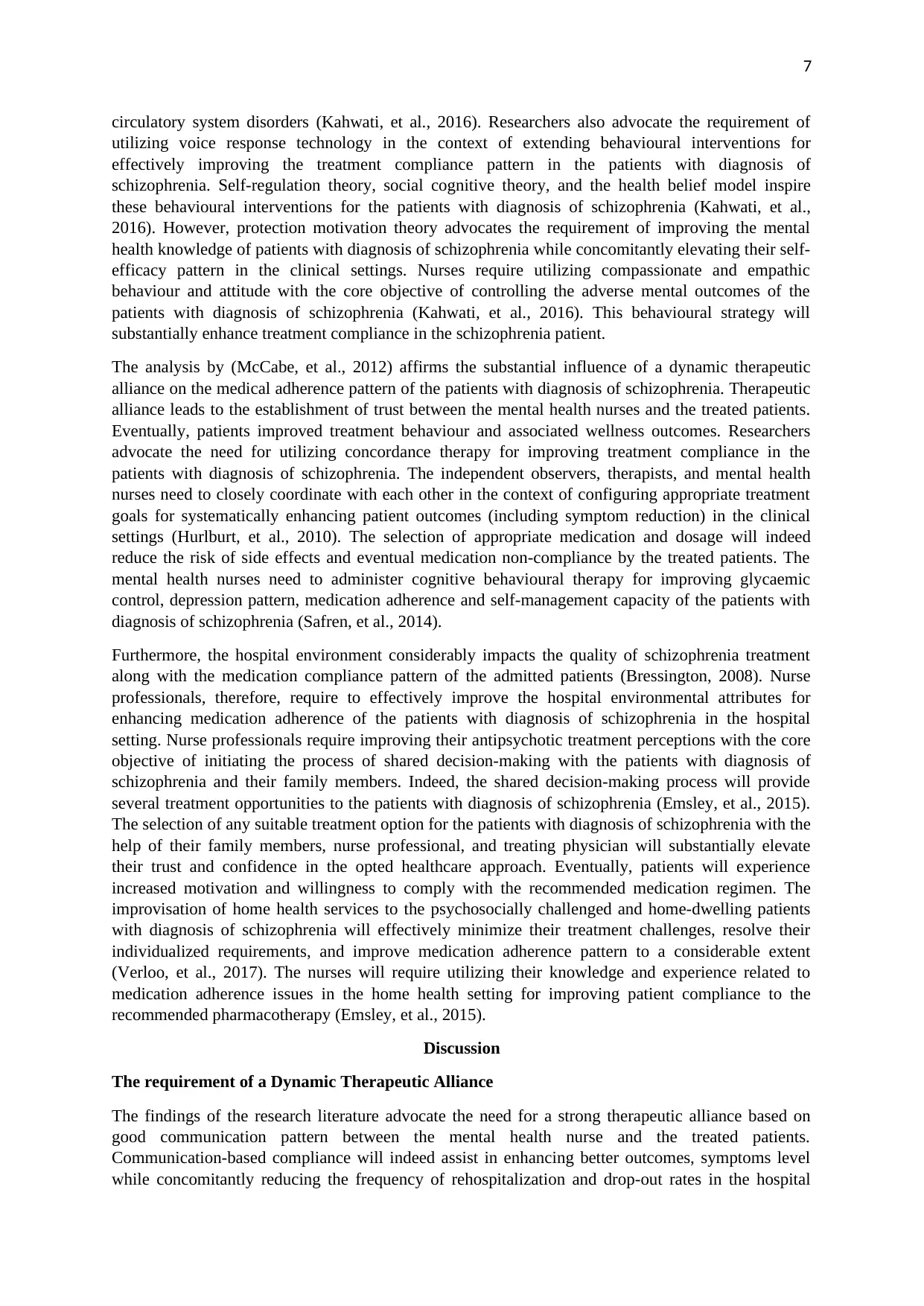
7
circulatory system disorders (Kahwati, et al., 2016). Researchers also advocate the requirement of
utilizing voice response technology in the context of extending behavioural interventions for
effectively improving the treatment compliance pattern in the patients with diagnosis of
schizophrenia. Self-regulation theory, social cognitive theory, and the health belief model inspire
these behavioural interventions for the patients with diagnosis of schizophrenia (Kahwati, et al.,
2016). However, protection motivation theory advocates the requirement of improving the mental
health knowledge of patients with diagnosis of schizophrenia while concomitantly elevating their self-
efficacy pattern in the clinical settings. Nurses require utilizing compassionate and empathic
behaviour and attitude with the core objective of controlling the adverse mental outcomes of the
patients with diagnosis of schizophrenia (Kahwati, et al., 2016). This behavioural strategy will
substantially enhance treatment compliance in the schizophrenia patient.
The analysis by (McCabe, et al., 2012) affirms the substantial influence of a dynamic therapeutic
alliance on the medical adherence pattern of the patients with diagnosis of schizophrenia. Therapeutic
alliance leads to the establishment of trust between the mental health nurses and the treated patients.
Eventually, patients improved treatment behaviour and associated wellness outcomes. Researchers
advocate the need for utilizing concordance therapy for improving treatment compliance in the
patients with diagnosis of schizophrenia. The independent observers, therapists, and mental health
nurses need to closely coordinate with each other in the context of configuring appropriate treatment
goals for systematically enhancing patient outcomes (including symptom reduction) in the clinical
settings (Hurlburt, et al., 2010). The selection of appropriate medication and dosage will indeed
reduce the risk of side effects and eventual medication non-compliance by the treated patients. The
mental health nurses need to administer cognitive behavioural therapy for improving glycaemic
control, depression pattern, medication adherence and self-management capacity of the patients with
diagnosis of schizophrenia (Safren, et al., 2014).
Furthermore, the hospital environment considerably impacts the quality of schizophrenia treatment
along with the medication compliance pattern of the admitted patients (Bressington, 2008). Nurse
professionals, therefore, require to effectively improve the hospital environmental attributes for
enhancing medication adherence of the patients with diagnosis of schizophrenia in the hospital
setting. Nurse professionals require improving their antipsychotic treatment perceptions with the core
objective of initiating the process of shared decision-making with the patients with diagnosis of
schizophrenia and their family members. Indeed, the shared decision-making process will provide
several treatment opportunities to the patients with diagnosis of schizophrenia (Emsley, et al., 2015).
The selection of any suitable treatment option for the patients with diagnosis of schizophrenia with the
help of their family members, nurse professional, and treating physician will substantially elevate
their trust and confidence in the opted healthcare approach. Eventually, patients will experience
increased motivation and willingness to comply with the recommended medication regimen. The
improvisation of home health services to the psychosocially challenged and home-dwelling patients
with diagnosis of schizophrenia will effectively minimize their treatment challenges, resolve their
individualized requirements, and improve medication adherence pattern to a considerable extent
(Verloo, et al., 2017). The nurses will require utilizing their knowledge and experience related to
medication adherence issues in the home health setting for improving patient compliance to the
recommended pharmacotherapy (Emsley, et al., 2015).
Discussion
The requirement of a Dynamic Therapeutic Alliance
The findings of the research literature advocate the need for a strong therapeutic alliance based on
good communication pattern between the mental health nurse and the treated patients.
Communication-based compliance will indeed assist in enhancing better outcomes, symptoms level
while concomitantly reducing the frequency of rehospitalization and drop-out rates in the hospital
circulatory system disorders (Kahwati, et al., 2016). Researchers also advocate the requirement of
utilizing voice response technology in the context of extending behavioural interventions for
effectively improving the treatment compliance pattern in the patients with diagnosis of
schizophrenia. Self-regulation theory, social cognitive theory, and the health belief model inspire
these behavioural interventions for the patients with diagnosis of schizophrenia (Kahwati, et al.,
2016). However, protection motivation theory advocates the requirement of improving the mental
health knowledge of patients with diagnosis of schizophrenia while concomitantly elevating their self-
efficacy pattern in the clinical settings. Nurses require utilizing compassionate and empathic
behaviour and attitude with the core objective of controlling the adverse mental outcomes of the
patients with diagnosis of schizophrenia (Kahwati, et al., 2016). This behavioural strategy will
substantially enhance treatment compliance in the schizophrenia patient.
The analysis by (McCabe, et al., 2012) affirms the substantial influence of a dynamic therapeutic
alliance on the medical adherence pattern of the patients with diagnosis of schizophrenia. Therapeutic
alliance leads to the establishment of trust between the mental health nurses and the treated patients.
Eventually, patients improved treatment behaviour and associated wellness outcomes. Researchers
advocate the need for utilizing concordance therapy for improving treatment compliance in the
patients with diagnosis of schizophrenia. The independent observers, therapists, and mental health
nurses need to closely coordinate with each other in the context of configuring appropriate treatment
goals for systematically enhancing patient outcomes (including symptom reduction) in the clinical
settings (Hurlburt, et al., 2010). The selection of appropriate medication and dosage will indeed
reduce the risk of side effects and eventual medication non-compliance by the treated patients. The
mental health nurses need to administer cognitive behavioural therapy for improving glycaemic
control, depression pattern, medication adherence and self-management capacity of the patients with
diagnosis of schizophrenia (Safren, et al., 2014).
Furthermore, the hospital environment considerably impacts the quality of schizophrenia treatment
along with the medication compliance pattern of the admitted patients (Bressington, 2008). Nurse
professionals, therefore, require to effectively improve the hospital environmental attributes for
enhancing medication adherence of the patients with diagnosis of schizophrenia in the hospital
setting. Nurse professionals require improving their antipsychotic treatment perceptions with the core
objective of initiating the process of shared decision-making with the patients with diagnosis of
schizophrenia and their family members. Indeed, the shared decision-making process will provide
several treatment opportunities to the patients with diagnosis of schizophrenia (Emsley, et al., 2015).
The selection of any suitable treatment option for the patients with diagnosis of schizophrenia with the
help of their family members, nurse professional, and treating physician will substantially elevate
their trust and confidence in the opted healthcare approach. Eventually, patients will experience
increased motivation and willingness to comply with the recommended medication regimen. The
improvisation of home health services to the psychosocially challenged and home-dwelling patients
with diagnosis of schizophrenia will effectively minimize their treatment challenges, resolve their
individualized requirements, and improve medication adherence pattern to a considerable extent
(Verloo, et al., 2017). The nurses will require utilizing their knowledge and experience related to
medication adherence issues in the home health setting for improving patient compliance to the
recommended pharmacotherapy (Emsley, et al., 2015).
Discussion
The requirement of a Dynamic Therapeutic Alliance
The findings of the research literature advocate the need for a strong therapeutic alliance based on
good communication pattern between the mental health nurse and the treated patients.
Communication-based compliance will indeed assist in enhancing better outcomes, symptoms level
while concomitantly reducing the frequency of rehospitalization and drop-out rates in the hospital
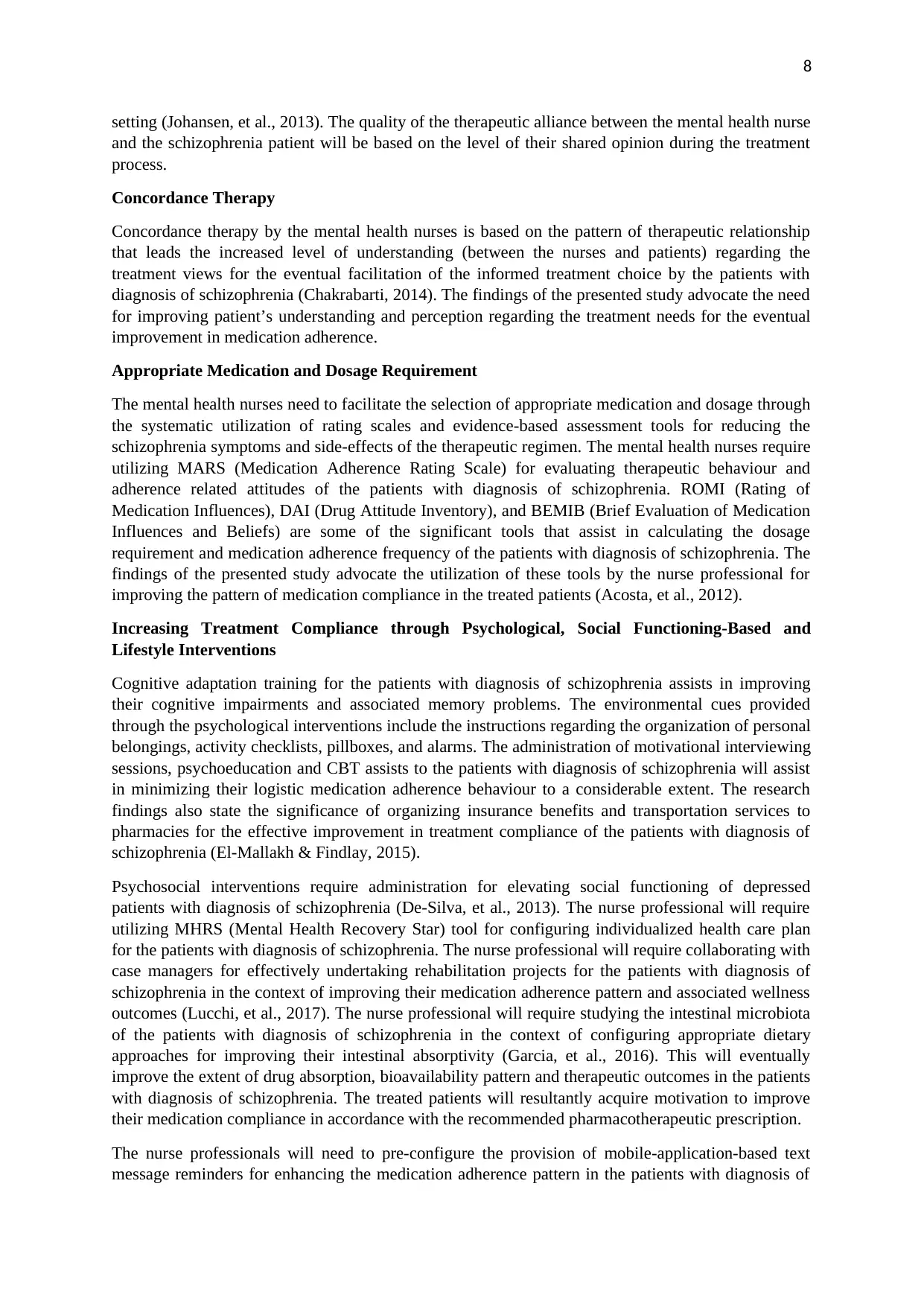
8
setting (Johansen, et al., 2013). The quality of the therapeutic alliance between the mental health nurse
and the schizophrenia patient will be based on the level of their shared opinion during the treatment
process.
Concordance Therapy
Concordance therapy by the mental health nurses is based on the pattern of therapeutic relationship
that leads the increased level of understanding (between the nurses and patients) regarding the
treatment views for the eventual facilitation of the informed treatment choice by the patients with
diagnosis of schizophrenia (Chakrabarti, 2014). The findings of the presented study advocate the need
for improving patient’s understanding and perception regarding the treatment needs for the eventual
improvement in medication adherence.
Appropriate Medication and Dosage Requirement
The mental health nurses need to facilitate the selection of appropriate medication and dosage through
the systematic utilization of rating scales and evidence-based assessment tools for reducing the
schizophrenia symptoms and side-effects of the therapeutic regimen. The mental health nurses require
utilizing MARS (Medication Adherence Rating Scale) for evaluating therapeutic behaviour and
adherence related attitudes of the patients with diagnosis of schizophrenia. ROMI (Rating of
Medication Influences), DAI (Drug Attitude Inventory), and BEMIB (Brief Evaluation of Medication
Influences and Beliefs) are some of the significant tools that assist in calculating the dosage
requirement and medication adherence frequency of the patients with diagnosis of schizophrenia. The
findings of the presented study advocate the utilization of these tools by the nurse professional for
improving the pattern of medication compliance in the treated patients (Acosta, et al., 2012).
Increasing Treatment Compliance through Psychological, Social Functioning-Based and
Lifestyle Interventions
Cognitive adaptation training for the patients with diagnosis of schizophrenia assists in improving
their cognitive impairments and associated memory problems. The environmental cues provided
through the psychological interventions include the instructions regarding the organization of personal
belongings, activity checklists, pillboxes, and alarms. The administration of motivational interviewing
sessions, psychoeducation and CBT assists to the patients with diagnosis of schizophrenia will assist
in minimizing their logistic medication adherence behaviour to a considerable extent. The research
findings also state the significance of organizing insurance benefits and transportation services to
pharmacies for the effective improvement in treatment compliance of the patients with diagnosis of
schizophrenia (El-Mallakh & Findlay, 2015).
Psychosocial interventions require administration for elevating social functioning of depressed
patients with diagnosis of schizophrenia (De-Silva, et al., 2013). The nurse professional will require
utilizing MHRS (Mental Health Recovery Star) tool for configuring individualized health care plan
for the patients with diagnosis of schizophrenia. The nurse professional will require collaborating with
case managers for effectively undertaking rehabilitation projects for the patients with diagnosis of
schizophrenia in the context of improving their medication adherence pattern and associated wellness
outcomes (Lucchi, et al., 2017). The nurse professional will require studying the intestinal microbiota
of the patients with diagnosis of schizophrenia in the context of configuring appropriate dietary
approaches for improving their intestinal absorptivity (Garcia, et al., 2016). This will eventually
improve the extent of drug absorption, bioavailability pattern and therapeutic outcomes in the patients
with diagnosis of schizophrenia. The treated patients will resultantly acquire motivation to improve
their medication compliance in accordance with the recommended pharmacotherapeutic prescription.
The nurse professionals will need to pre-configure the provision of mobile-application-based text
message reminders for enhancing the medication adherence pattern in the patients with diagnosis of
setting (Johansen, et al., 2013). The quality of the therapeutic alliance between the mental health nurse
and the schizophrenia patient will be based on the level of their shared opinion during the treatment
process.
Concordance Therapy
Concordance therapy by the mental health nurses is based on the pattern of therapeutic relationship
that leads the increased level of understanding (between the nurses and patients) regarding the
treatment views for the eventual facilitation of the informed treatment choice by the patients with
diagnosis of schizophrenia (Chakrabarti, 2014). The findings of the presented study advocate the need
for improving patient’s understanding and perception regarding the treatment needs for the eventual
improvement in medication adherence.
Appropriate Medication and Dosage Requirement
The mental health nurses need to facilitate the selection of appropriate medication and dosage through
the systematic utilization of rating scales and evidence-based assessment tools for reducing the
schizophrenia symptoms and side-effects of the therapeutic regimen. The mental health nurses require
utilizing MARS (Medication Adherence Rating Scale) for evaluating therapeutic behaviour and
adherence related attitudes of the patients with diagnosis of schizophrenia. ROMI (Rating of
Medication Influences), DAI (Drug Attitude Inventory), and BEMIB (Brief Evaluation of Medication
Influences and Beliefs) are some of the significant tools that assist in calculating the dosage
requirement and medication adherence frequency of the patients with diagnosis of schizophrenia. The
findings of the presented study advocate the utilization of these tools by the nurse professional for
improving the pattern of medication compliance in the treated patients (Acosta, et al., 2012).
Increasing Treatment Compliance through Psychological, Social Functioning-Based and
Lifestyle Interventions
Cognitive adaptation training for the patients with diagnosis of schizophrenia assists in improving
their cognitive impairments and associated memory problems. The environmental cues provided
through the psychological interventions include the instructions regarding the organization of personal
belongings, activity checklists, pillboxes, and alarms. The administration of motivational interviewing
sessions, psychoeducation and CBT assists to the patients with diagnosis of schizophrenia will assist
in minimizing their logistic medication adherence behaviour to a considerable extent. The research
findings also state the significance of organizing insurance benefits and transportation services to
pharmacies for the effective improvement in treatment compliance of the patients with diagnosis of
schizophrenia (El-Mallakh & Findlay, 2015).
Psychosocial interventions require administration for elevating social functioning of depressed
patients with diagnosis of schizophrenia (De-Silva, et al., 2013). The nurse professional will require
utilizing MHRS (Mental Health Recovery Star) tool for configuring individualized health care plan
for the patients with diagnosis of schizophrenia. The nurse professional will require collaborating with
case managers for effectively undertaking rehabilitation projects for the patients with diagnosis of
schizophrenia in the context of improving their medication adherence pattern and associated wellness
outcomes (Lucchi, et al., 2017). The nurse professional will require studying the intestinal microbiota
of the patients with diagnosis of schizophrenia in the context of configuring appropriate dietary
approaches for improving their intestinal absorptivity (Garcia, et al., 2016). This will eventually
improve the extent of drug absorption, bioavailability pattern and therapeutic outcomes in the patients
with diagnosis of schizophrenia. The treated patients will resultantly acquire motivation to improve
their medication compliance in accordance with the recommended pharmacotherapeutic prescription.
The nurse professionals will need to pre-configure the provision of mobile-application-based text
message reminders for enhancing the medication adherence pattern in the patients with diagnosis of
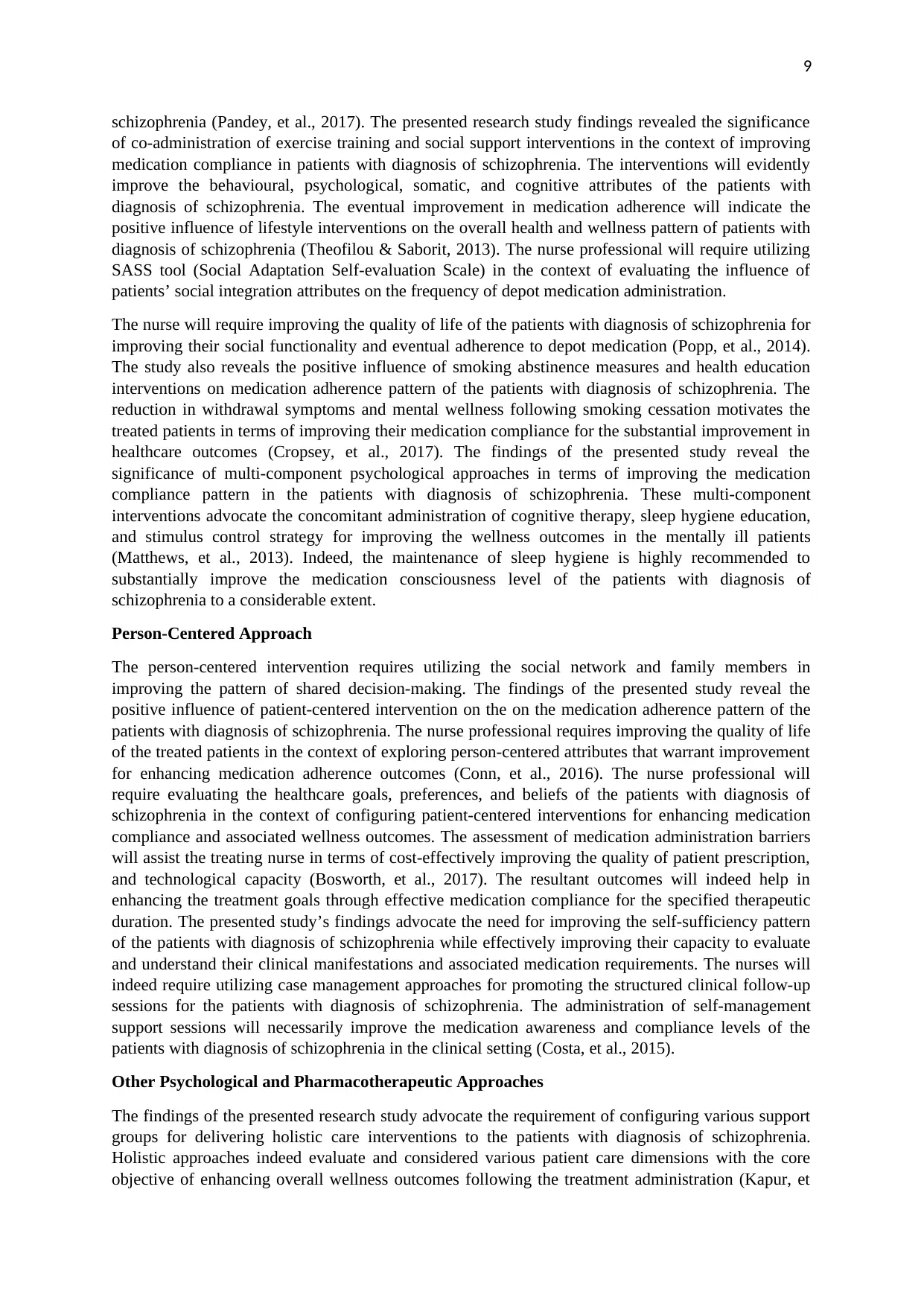
9
schizophrenia (Pandey, et al., 2017). The presented research study findings revealed the significance
of co-administration of exercise training and social support interventions in the context of improving
medication compliance in patients with diagnosis of schizophrenia. The interventions will evidently
improve the behavioural, psychological, somatic, and cognitive attributes of the patients with
diagnosis of schizophrenia. The eventual improvement in medication adherence will indicate the
positive influence of lifestyle interventions on the overall health and wellness pattern of patients with
diagnosis of schizophrenia (Theofilou & Saborit, 2013). The nurse professional will require utilizing
SASS tool (Social Adaptation Self-evaluation Scale) in the context of evaluating the influence of
patients’ social integration attributes on the frequency of depot medication administration.
The nurse will require improving the quality of life of the patients with diagnosis of schizophrenia for
improving their social functionality and eventual adherence to depot medication (Popp, et al., 2014).
The study also reveals the positive influence of smoking abstinence measures and health education
interventions on medication adherence pattern of the patients with diagnosis of schizophrenia. The
reduction in withdrawal symptoms and mental wellness following smoking cessation motivates the
treated patients in terms of improving their medication compliance for the substantial improvement in
healthcare outcomes (Cropsey, et al., 2017). The findings of the presented study reveal the
significance of multi-component psychological approaches in terms of improving the medication
compliance pattern in the patients with diagnosis of schizophrenia. These multi-component
interventions advocate the concomitant administration of cognitive therapy, sleep hygiene education,
and stimulus control strategy for improving the wellness outcomes in the mentally ill patients
(Matthews, et al., 2013). Indeed, the maintenance of sleep hygiene is highly recommended to
substantially improve the medication consciousness level of the patients with diagnosis of
schizophrenia to a considerable extent.
Person-Centered Approach
The person-centered intervention requires utilizing the social network and family members in
improving the pattern of shared decision-making. The findings of the presented study reveal the
positive influence of patient-centered intervention on the on the medication adherence pattern of the
patients with diagnosis of schizophrenia. The nurse professional requires improving the quality of life
of the treated patients in the context of exploring person-centered attributes that warrant improvement
for enhancing medication adherence outcomes (Conn, et al., 2016). The nurse professional will
require evaluating the healthcare goals, preferences, and beliefs of the patients with diagnosis of
schizophrenia in the context of configuring patient-centered interventions for enhancing medication
compliance and associated wellness outcomes. The assessment of medication administration barriers
will assist the treating nurse in terms of cost-effectively improving the quality of patient prescription,
and technological capacity (Bosworth, et al., 2017). The resultant outcomes will indeed help in
enhancing the treatment goals through effective medication compliance for the specified therapeutic
duration. The presented study’s findings advocate the need for improving the self-sufficiency pattern
of the patients with diagnosis of schizophrenia while effectively improving their capacity to evaluate
and understand their clinical manifestations and associated medication requirements. The nurses will
indeed require utilizing case management approaches for promoting the structured clinical follow-up
sessions for the patients with diagnosis of schizophrenia. The administration of self-management
support sessions will necessarily improve the medication awareness and compliance levels of the
patients with diagnosis of schizophrenia in the clinical setting (Costa, et al., 2015).
Other Psychological and Pharmacotherapeutic Approaches
The findings of the presented research study advocate the requirement of configuring various support
groups for delivering holistic care interventions to the patients with diagnosis of schizophrenia.
Holistic approaches indeed evaluate and considered various patient care dimensions with the core
objective of enhancing overall wellness outcomes following the treatment administration (Kapur, et
schizophrenia (Pandey, et al., 2017). The presented research study findings revealed the significance
of co-administration of exercise training and social support interventions in the context of improving
medication compliance in patients with diagnosis of schizophrenia. The interventions will evidently
improve the behavioural, psychological, somatic, and cognitive attributes of the patients with
diagnosis of schizophrenia. The eventual improvement in medication adherence will indicate the
positive influence of lifestyle interventions on the overall health and wellness pattern of patients with
diagnosis of schizophrenia (Theofilou & Saborit, 2013). The nurse professional will require utilizing
SASS tool (Social Adaptation Self-evaluation Scale) in the context of evaluating the influence of
patients’ social integration attributes on the frequency of depot medication administration.
The nurse will require improving the quality of life of the patients with diagnosis of schizophrenia for
improving their social functionality and eventual adherence to depot medication (Popp, et al., 2014).
The study also reveals the positive influence of smoking abstinence measures and health education
interventions on medication adherence pattern of the patients with diagnosis of schizophrenia. The
reduction in withdrawal symptoms and mental wellness following smoking cessation motivates the
treated patients in terms of improving their medication compliance for the substantial improvement in
healthcare outcomes (Cropsey, et al., 2017). The findings of the presented study reveal the
significance of multi-component psychological approaches in terms of improving the medication
compliance pattern in the patients with diagnosis of schizophrenia. These multi-component
interventions advocate the concomitant administration of cognitive therapy, sleep hygiene education,
and stimulus control strategy for improving the wellness outcomes in the mentally ill patients
(Matthews, et al., 2013). Indeed, the maintenance of sleep hygiene is highly recommended to
substantially improve the medication consciousness level of the patients with diagnosis of
schizophrenia to a considerable extent.
Person-Centered Approach
The person-centered intervention requires utilizing the social network and family members in
improving the pattern of shared decision-making. The findings of the presented study reveal the
positive influence of patient-centered intervention on the on the medication adherence pattern of the
patients with diagnosis of schizophrenia. The nurse professional requires improving the quality of life
of the treated patients in the context of exploring person-centered attributes that warrant improvement
for enhancing medication adherence outcomes (Conn, et al., 2016). The nurse professional will
require evaluating the healthcare goals, preferences, and beliefs of the patients with diagnosis of
schizophrenia in the context of configuring patient-centered interventions for enhancing medication
compliance and associated wellness outcomes. The assessment of medication administration barriers
will assist the treating nurse in terms of cost-effectively improving the quality of patient prescription,
and technological capacity (Bosworth, et al., 2017). The resultant outcomes will indeed help in
enhancing the treatment goals through effective medication compliance for the specified therapeutic
duration. The presented study’s findings advocate the need for improving the self-sufficiency pattern
of the patients with diagnosis of schizophrenia while effectively improving their capacity to evaluate
and understand their clinical manifestations and associated medication requirements. The nurses will
indeed require utilizing case management approaches for promoting the structured clinical follow-up
sessions for the patients with diagnosis of schizophrenia. The administration of self-management
support sessions will necessarily improve the medication awareness and compliance levels of the
patients with diagnosis of schizophrenia in the clinical setting (Costa, et al., 2015).
Other Psychological and Pharmacotherapeutic Approaches
The findings of the presented research study advocate the requirement of configuring various support
groups for delivering holistic care interventions to the patients with diagnosis of schizophrenia.
Holistic approaches indeed evaluate and considered various patient care dimensions with the core
objective of enhancing overall wellness outcomes following the treatment administration (Kapur, et
Secure Best Marks with AI Grader
Need help grading? Try our AI Grader for instant feedback on your assignments.
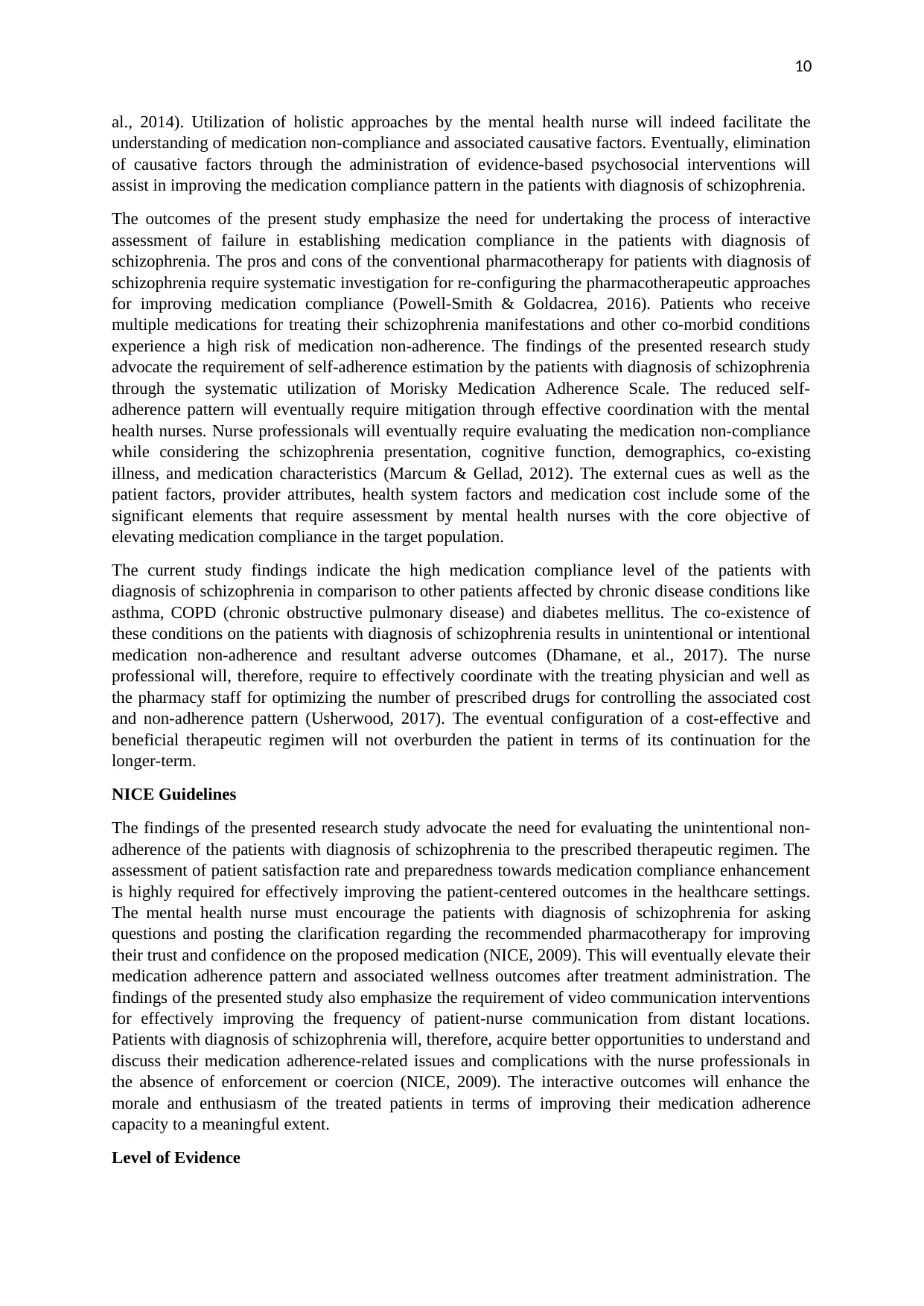
10
al., 2014). Utilization of holistic approaches by the mental health nurse will indeed facilitate the
understanding of medication non-compliance and associated causative factors. Eventually, elimination
of causative factors through the administration of evidence-based psychosocial interventions will
assist in improving the medication compliance pattern in the patients with diagnosis of schizophrenia.
The outcomes of the present study emphasize the need for undertaking the process of interactive
assessment of failure in establishing medication compliance in the patients with diagnosis of
schizophrenia. The pros and cons of the conventional pharmacotherapy for patients with diagnosis of
schizophrenia require systematic investigation for re-configuring the pharmacotherapeutic approaches
for improving medication compliance (Powell-Smith & Goldacrea, 2016). Patients who receive
multiple medications for treating their schizophrenia manifestations and other co-morbid conditions
experience a high risk of medication non-adherence. The findings of the presented research study
advocate the requirement of self-adherence estimation by the patients with diagnosis of schizophrenia
through the systematic utilization of Morisky Medication Adherence Scale. The reduced self-
adherence pattern will eventually require mitigation through effective coordination with the mental
health nurses. Nurse professionals will eventually require evaluating the medication non-compliance
while considering the schizophrenia presentation, cognitive function, demographics, co-existing
illness, and medication characteristics (Marcum & Gellad, 2012). The external cues as well as the
patient factors, provider attributes, health system factors and medication cost include some of the
significant elements that require assessment by mental health nurses with the core objective of
elevating medication compliance in the target population.
The current study findings indicate the high medication compliance level of the patients with
diagnosis of schizophrenia in comparison to other patients affected by chronic disease conditions like
asthma, COPD (chronic obstructive pulmonary disease) and diabetes mellitus. The co-existence of
these conditions on the patients with diagnosis of schizophrenia results in unintentional or intentional
medication non-adherence and resultant adverse outcomes (Dhamane, et al., 2017). The nurse
professional will, therefore, require to effectively coordinate with the treating physician and well as
the pharmacy staff for optimizing the number of prescribed drugs for controlling the associated cost
and non-adherence pattern (Usherwood, 2017). The eventual configuration of a cost-effective and
beneficial therapeutic regimen will not overburden the patient in terms of its continuation for the
longer-term.
NICE Guidelines
The findings of the presented research study advocate the need for evaluating the unintentional non-
adherence of the patients with diagnosis of schizophrenia to the prescribed therapeutic regimen. The
assessment of patient satisfaction rate and preparedness towards medication compliance enhancement
is highly required for effectively improving the patient-centered outcomes in the healthcare settings.
The mental health nurse must encourage the patients with diagnosis of schizophrenia for asking
questions and posting the clarification regarding the recommended pharmacotherapy for improving
their trust and confidence on the proposed medication (NICE, 2009). This will eventually elevate their
medication adherence pattern and associated wellness outcomes after treatment administration. The
findings of the presented study also emphasize the requirement of video communication interventions
for effectively improving the frequency of patient-nurse communication from distant locations.
Patients with diagnosis of schizophrenia will, therefore, acquire better opportunities to understand and
discuss their medication adherence-related issues and complications with the nurse professionals in
the absence of enforcement or coercion (NICE, 2009). The interactive outcomes will enhance the
morale and enthusiasm of the treated patients in terms of improving their medication adherence
capacity to a meaningful extent.
Level of Evidence
al., 2014). Utilization of holistic approaches by the mental health nurse will indeed facilitate the
understanding of medication non-compliance and associated causative factors. Eventually, elimination
of causative factors through the administration of evidence-based psychosocial interventions will
assist in improving the medication compliance pattern in the patients with diagnosis of schizophrenia.
The outcomes of the present study emphasize the need for undertaking the process of interactive
assessment of failure in establishing medication compliance in the patients with diagnosis of
schizophrenia. The pros and cons of the conventional pharmacotherapy for patients with diagnosis of
schizophrenia require systematic investigation for re-configuring the pharmacotherapeutic approaches
for improving medication compliance (Powell-Smith & Goldacrea, 2016). Patients who receive
multiple medications for treating their schizophrenia manifestations and other co-morbid conditions
experience a high risk of medication non-adherence. The findings of the presented research study
advocate the requirement of self-adherence estimation by the patients with diagnosis of schizophrenia
through the systematic utilization of Morisky Medication Adherence Scale. The reduced self-
adherence pattern will eventually require mitigation through effective coordination with the mental
health nurses. Nurse professionals will eventually require evaluating the medication non-compliance
while considering the schizophrenia presentation, cognitive function, demographics, co-existing
illness, and medication characteristics (Marcum & Gellad, 2012). The external cues as well as the
patient factors, provider attributes, health system factors and medication cost include some of the
significant elements that require assessment by mental health nurses with the core objective of
elevating medication compliance in the target population.
The current study findings indicate the high medication compliance level of the patients with
diagnosis of schizophrenia in comparison to other patients affected by chronic disease conditions like
asthma, COPD (chronic obstructive pulmonary disease) and diabetes mellitus. The co-existence of
these conditions on the patients with diagnosis of schizophrenia results in unintentional or intentional
medication non-adherence and resultant adverse outcomes (Dhamane, et al., 2017). The nurse
professional will, therefore, require to effectively coordinate with the treating physician and well as
the pharmacy staff for optimizing the number of prescribed drugs for controlling the associated cost
and non-adherence pattern (Usherwood, 2017). The eventual configuration of a cost-effective and
beneficial therapeutic regimen will not overburden the patient in terms of its continuation for the
longer-term.
NICE Guidelines
The findings of the presented research study advocate the need for evaluating the unintentional non-
adherence of the patients with diagnosis of schizophrenia to the prescribed therapeutic regimen. The
assessment of patient satisfaction rate and preparedness towards medication compliance enhancement
is highly required for effectively improving the patient-centered outcomes in the healthcare settings.
The mental health nurse must encourage the patients with diagnosis of schizophrenia for asking
questions and posting the clarification regarding the recommended pharmacotherapy for improving
their trust and confidence on the proposed medication (NICE, 2009). This will eventually elevate their
medication adherence pattern and associated wellness outcomes after treatment administration. The
findings of the presented study also emphasize the requirement of video communication interventions
for effectively improving the frequency of patient-nurse communication from distant locations.
Patients with diagnosis of schizophrenia will, therefore, acquire better opportunities to understand and
discuss their medication adherence-related issues and complications with the nurse professionals in
the absence of enforcement or coercion (NICE, 2009). The interactive outcomes will enhance the
morale and enthusiasm of the treated patients in terms of improving their medication adherence
capacity to a meaningful extent.
Level of Evidence
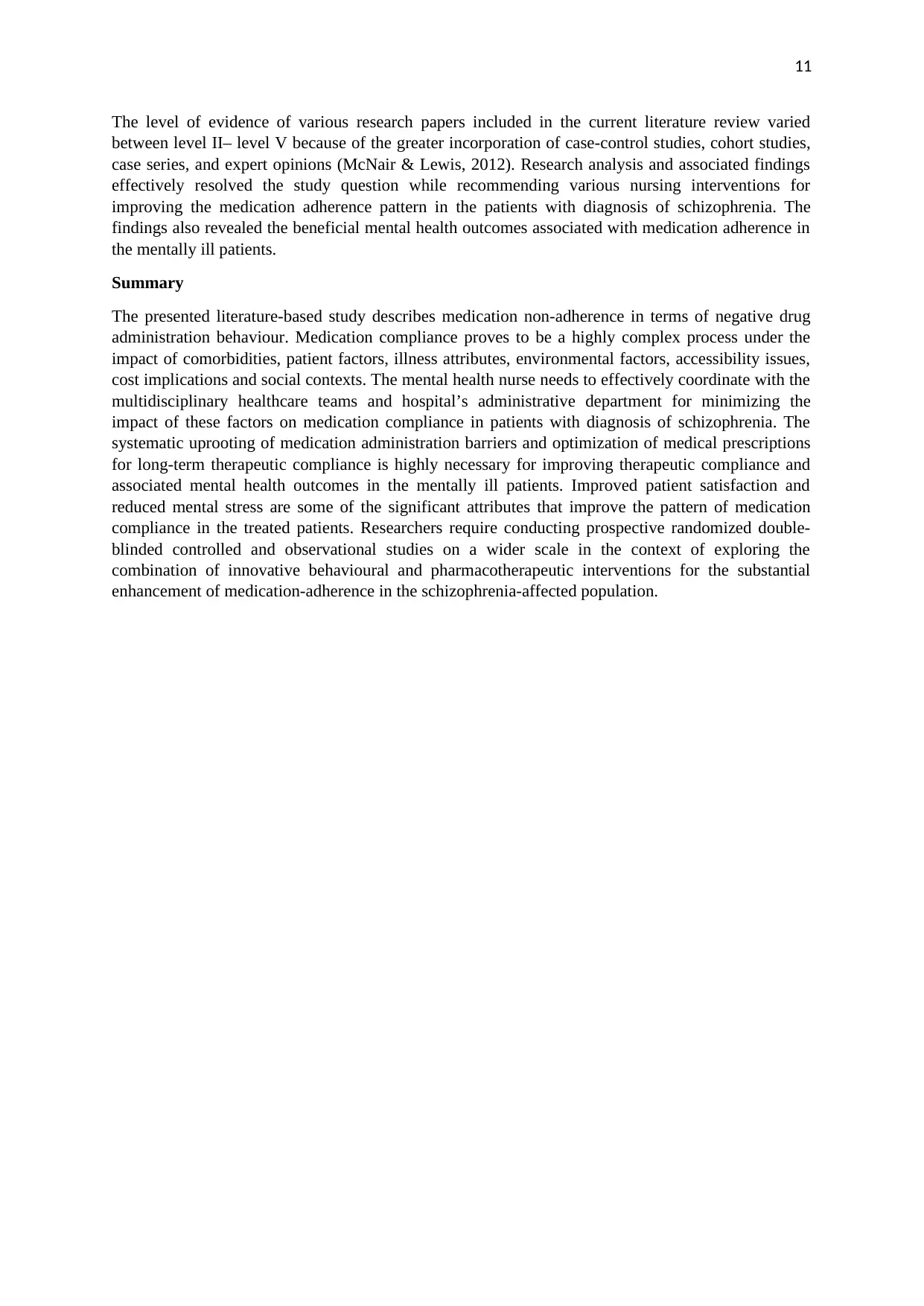
11
The level of evidence of various research papers included in the current literature review varied
between level II– level V because of the greater incorporation of case-control studies, cohort studies,
case series, and expert opinions (McNair & Lewis, 2012). Research analysis and associated findings
effectively resolved the study question while recommending various nursing interventions for
improving the medication adherence pattern in the patients with diagnosis of schizophrenia. The
findings also revealed the beneficial mental health outcomes associated with medication adherence in
the mentally ill patients.
Summary
The presented literature-based study describes medication non-adherence in terms of negative drug
administration behaviour. Medication compliance proves to be a highly complex process under the
impact of comorbidities, patient factors, illness attributes, environmental factors, accessibility issues,
cost implications and social contexts. The mental health nurse needs to effectively coordinate with the
multidisciplinary healthcare teams and hospital’s administrative department for minimizing the
impact of these factors on medication compliance in patients with diagnosis of schizophrenia. The
systematic uprooting of medication administration barriers and optimization of medical prescriptions
for long-term therapeutic compliance is highly necessary for improving therapeutic compliance and
associated mental health outcomes in the mentally ill patients. Improved patient satisfaction and
reduced mental stress are some of the significant attributes that improve the pattern of medication
compliance in the treated patients. Researchers require conducting prospective randomized double-
blinded controlled and observational studies on a wider scale in the context of exploring the
combination of innovative behavioural and pharmacotherapeutic interventions for the substantial
enhancement of medication-adherence in the schizophrenia-affected population.
The level of evidence of various research papers included in the current literature review varied
between level II– level V because of the greater incorporation of case-control studies, cohort studies,
case series, and expert opinions (McNair & Lewis, 2012). Research analysis and associated findings
effectively resolved the study question while recommending various nursing interventions for
improving the medication adherence pattern in the patients with diagnosis of schizophrenia. The
findings also revealed the beneficial mental health outcomes associated with medication adherence in
the mentally ill patients.
Summary
The presented literature-based study describes medication non-adherence in terms of negative drug
administration behaviour. Medication compliance proves to be a highly complex process under the
impact of comorbidities, patient factors, illness attributes, environmental factors, accessibility issues,
cost implications and social contexts. The mental health nurse needs to effectively coordinate with the
multidisciplinary healthcare teams and hospital’s administrative department for minimizing the
impact of these factors on medication compliance in patients with diagnosis of schizophrenia. The
systematic uprooting of medication administration barriers and optimization of medical prescriptions
for long-term therapeutic compliance is highly necessary for improving therapeutic compliance and
associated mental health outcomes in the mentally ill patients. Improved patient satisfaction and
reduced mental stress are some of the significant attributes that improve the pattern of medication
compliance in the treated patients. Researchers require conducting prospective randomized double-
blinded controlled and observational studies on a wider scale in the context of exploring the
combination of innovative behavioural and pharmacotherapeutic interventions for the substantial
enhancement of medication-adherence in the schizophrenia-affected population.
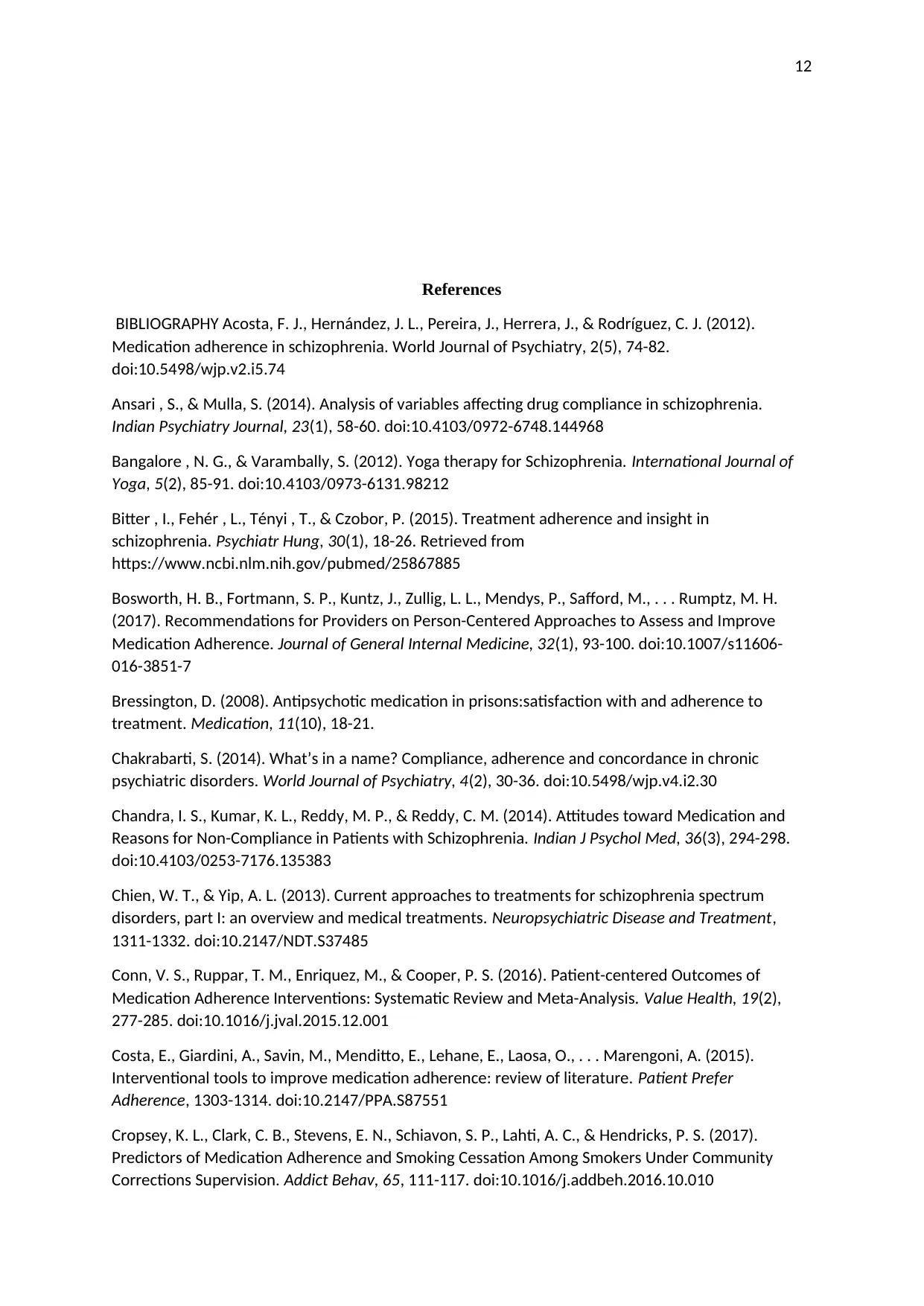
12
References
BIBLIOGRAPHY Acosta, F. J., Hernández, J. L., Pereira, J., Herrera, J., & Rodríguez, C. J. (2012).
Medication adherence in schizophrenia. World Journal of Psychiatry, 2(5), 74-82.
doi:10.5498/wjp.v2.i5.74
Ansari , S., & Mulla, S. (2014). Analysis of variables affecting drug compliance in schizophrenia.
Indian Psychiatry Journal, 23(1), 58-60. doi:10.4103/0972-6748.144968
Bangalore , N. G., & Varambally, S. (2012). Yoga therapy for Schizophrenia. International Journal of
Yoga, 5(2), 85-91. doi:10.4103/0973-6131.98212
Bitter , I., Fehér , L., Tényi , T., & Czobor, P. (2015). Treatment adherence and insight in
schizophrenia. Psychiatr Hung, 30(1), 18-26. Retrieved from
https://www.ncbi.nlm.nih.gov/pubmed/25867885
Bosworth, H. B., Fortmann, S. P., Kuntz, J., Zullig, L. L., Mendys, P., Safford, M., . . . Rumptz, M. H.
(2017). Recommendations for Providers on Person-Centered Approaches to Assess and Improve
Medication Adherence. Journal of General Internal Medicine, 32(1), 93-100. doi:10.1007/s11606-
016-3851-7
Bressington, D. (2008). Antipsychotic medication in prisons:satisfaction with and adherence to
treatment. Medication, 11(10), 18-21.
Chakrabarti, S. (2014). What’s in a name? Compliance, adherence and concordance in chronic
psychiatric disorders. World Journal of Psychiatry, 4(2), 30-36. doi:10.5498/wjp.v4.i2.30
Chandra, I. S., Kumar, K. L., Reddy, M. P., & Reddy, C. M. (2014). Attitudes toward Medication and
Reasons for Non-Compliance in Patients with Schizophrenia. Indian J Psychol Med, 36(3), 294-298.
doi:10.4103/0253-7176.135383
Chien, W. T., & Yip, A. L. (2013). Current approaches to treatments for schizophrenia spectrum
disorders, part I: an overview and medical treatments. Neuropsychiatric Disease and Treatment,
1311-1332. doi:10.2147/NDT.S37485
Conn, V. S., Ruppar, T. M., Enriquez, M., & Cooper, P. S. (2016). Patient-centered Outcomes of
Medication Adherence Interventions: Systematic Review and Meta-Analysis. Value Health, 19(2),
277-285. doi:10.1016/j.jval.2015.12.001
Costa, E., Giardini, A., Savin, M., Menditto, E., Lehane, E., Laosa, O., . . . Marengoni, A. (2015).
Interventional tools to improve medication adherence: review of literature. Patient Prefer
Adherence, 1303-1314. doi:10.2147/PPA.S87551
Cropsey, K. L., Clark, C. B., Stevens, E. N., Schiavon, S. P., Lahti, A. C., & Hendricks, P. S. (2017).
Predictors of Medication Adherence and Smoking Cessation Among Smokers Under Community
Corrections Supervision. Addict Behav, 65, 111-117. doi:10.1016/j.addbeh.2016.10.010
References
BIBLIOGRAPHY Acosta, F. J., Hernández, J. L., Pereira, J., Herrera, J., & Rodríguez, C. J. (2012).
Medication adherence in schizophrenia. World Journal of Psychiatry, 2(5), 74-82.
doi:10.5498/wjp.v2.i5.74
Ansari , S., & Mulla, S. (2014). Analysis of variables affecting drug compliance in schizophrenia.
Indian Psychiatry Journal, 23(1), 58-60. doi:10.4103/0972-6748.144968
Bangalore , N. G., & Varambally, S. (2012). Yoga therapy for Schizophrenia. International Journal of
Yoga, 5(2), 85-91. doi:10.4103/0973-6131.98212
Bitter , I., Fehér , L., Tényi , T., & Czobor, P. (2015). Treatment adherence and insight in
schizophrenia. Psychiatr Hung, 30(1), 18-26. Retrieved from
https://www.ncbi.nlm.nih.gov/pubmed/25867885
Bosworth, H. B., Fortmann, S. P., Kuntz, J., Zullig, L. L., Mendys, P., Safford, M., . . . Rumptz, M. H.
(2017). Recommendations for Providers on Person-Centered Approaches to Assess and Improve
Medication Adherence. Journal of General Internal Medicine, 32(1), 93-100. doi:10.1007/s11606-
016-3851-7
Bressington, D. (2008). Antipsychotic medication in prisons:satisfaction with and adherence to
treatment. Medication, 11(10), 18-21.
Chakrabarti, S. (2014). What’s in a name? Compliance, adherence and concordance in chronic
psychiatric disorders. World Journal of Psychiatry, 4(2), 30-36. doi:10.5498/wjp.v4.i2.30
Chandra, I. S., Kumar, K. L., Reddy, M. P., & Reddy, C. M. (2014). Attitudes toward Medication and
Reasons for Non-Compliance in Patients with Schizophrenia. Indian J Psychol Med, 36(3), 294-298.
doi:10.4103/0253-7176.135383
Chien, W. T., & Yip, A. L. (2013). Current approaches to treatments for schizophrenia spectrum
disorders, part I: an overview and medical treatments. Neuropsychiatric Disease and Treatment,
1311-1332. doi:10.2147/NDT.S37485
Conn, V. S., Ruppar, T. M., Enriquez, M., & Cooper, P. S. (2016). Patient-centered Outcomes of
Medication Adherence Interventions: Systematic Review and Meta-Analysis. Value Health, 19(2),
277-285. doi:10.1016/j.jval.2015.12.001
Costa, E., Giardini, A., Savin, M., Menditto, E., Lehane, E., Laosa, O., . . . Marengoni, A. (2015).
Interventional tools to improve medication adherence: review of literature. Patient Prefer
Adherence, 1303-1314. doi:10.2147/PPA.S87551
Cropsey, K. L., Clark, C. B., Stevens, E. N., Schiavon, S. P., Lahti, A. C., & Hendricks, P. S. (2017).
Predictors of Medication Adherence and Smoking Cessation Among Smokers Under Community
Corrections Supervision. Addict Behav, 65, 111-117. doi:10.1016/j.addbeh.2016.10.010
Paraphrase This Document
Need a fresh take? Get an instant paraphrase of this document with our AI Paraphraser
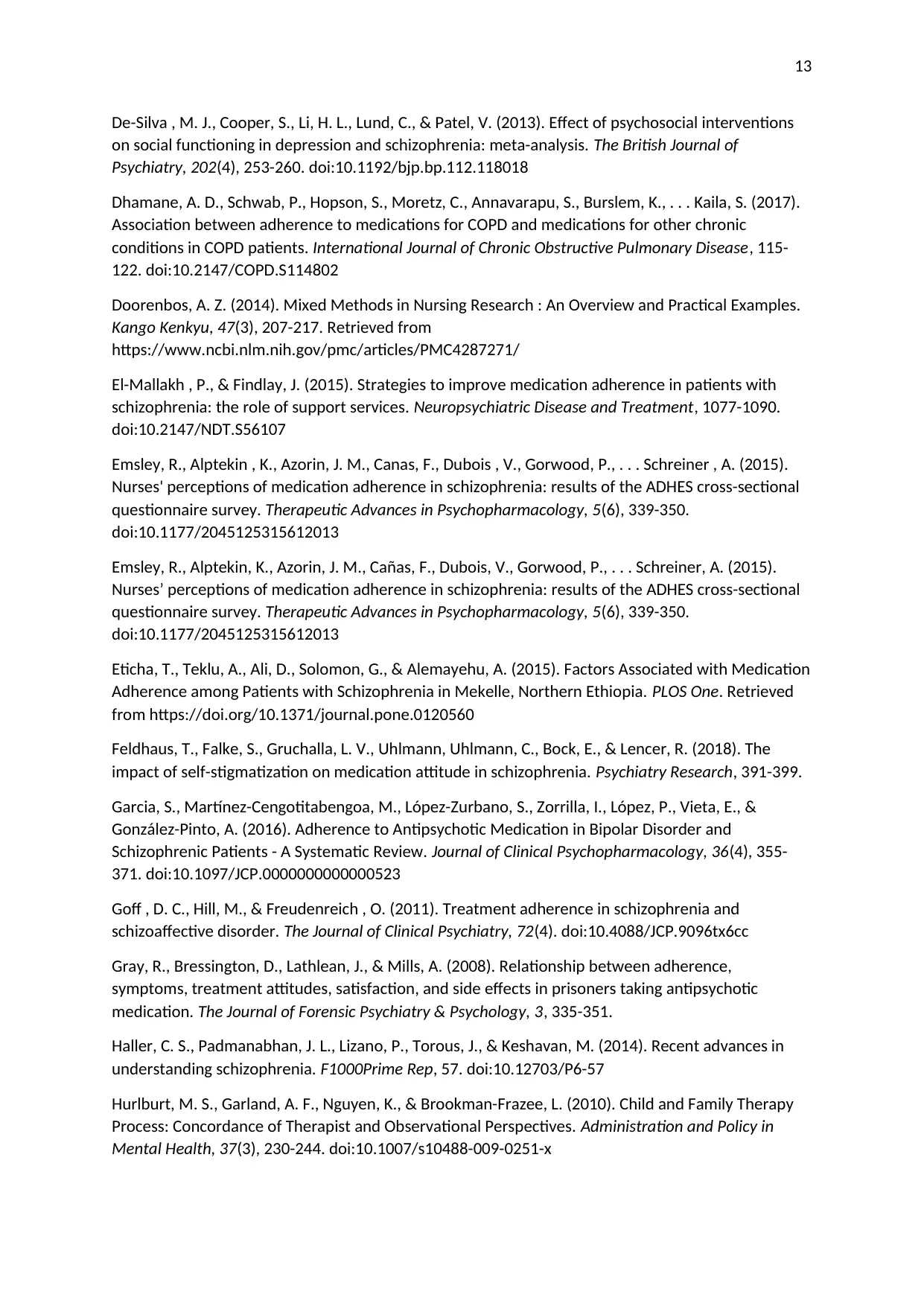
13
De-Silva , M. J., Cooper, S., Li, H. L., Lund, C., & Patel, V. (2013). Effect of psychosocial interventions
on social functioning in depression and schizophrenia: meta-analysis. The British Journal of
Psychiatry, 202(4), 253-260. doi:10.1192/bjp.bp.112.118018
Dhamane, A. D., Schwab, P., Hopson, S., Moretz, C., Annavarapu, S., Burslem, K., . . . Kaila, S. (2017).
Association between adherence to medications for COPD and medications for other chronic
conditions in COPD patients. International Journal of Chronic Obstructive Pulmonary Disease, 115-
122. doi:10.2147/COPD.S114802
Doorenbos, A. Z. (2014). Mixed Methods in Nursing Research : An Overview and Practical Examples.
Kango Kenkyu, 47(3), 207-217. Retrieved from
https://www.ncbi.nlm.nih.gov/pmc/articles/PMC4287271/
El-Mallakh , P., & Findlay, J. (2015). Strategies to improve medication adherence in patients with
schizophrenia: the role of support services. Neuropsychiatric Disease and Treatment, 1077-1090.
doi:10.2147/NDT.S56107
Emsley, R., Alptekin , K., Azorin, J. M., Canas, F., Dubois , V., Gorwood, P., . . . Schreiner , A. (2015).
Nurses' perceptions of medication adherence in schizophrenia: results of the ADHES cross-sectional
questionnaire survey. Therapeutic Advances in Psychopharmacology, 5(6), 339-350.
doi:10.1177/2045125315612013
Emsley, R., Alptekin, K., Azorin, J. M., Cañas, F., Dubois, V., Gorwood, P., . . . Schreiner, A. (2015).
Nurses’ perceptions of medication adherence in schizophrenia: results of the ADHES cross-sectional
questionnaire survey. Therapeutic Advances in Psychopharmacology, 5(6), 339-350.
doi:10.1177/2045125315612013
Eticha, T., Teklu, A., Ali, D., Solomon, G., & Alemayehu, A. (2015). Factors Associated with Medication
Adherence among Patients with Schizophrenia in Mekelle, Northern Ethiopia. PLOS One. Retrieved
from https://doi.org/10.1371/journal.pone.0120560
Feldhaus, T., Falke, S., Gruchalla, L. V., Uhlmann, Uhlmann, C., Bock, E., & Lencer, R. (2018). The
impact of self-stigmatization on medication attitude in schizophrenia. Psychiatry Research, 391-399.
Garcia, S., Martínez-Cengotitabengoa, M., López-Zurbano, S., Zorrilla, I., López, P., Vieta, E., &
González-Pinto, A. (2016). Adherence to Antipsychotic Medication in Bipolar Disorder and
Schizophrenic Patients - A Systematic Review. Journal of Clinical Psychopharmacology, 36(4), 355-
371. doi:10.1097/JCP.0000000000000523
Goff , D. C., Hill, M., & Freudenreich , O. (2011). Treatment adherence in schizophrenia and
schizoaffective disorder. The Journal of Clinical Psychiatry, 72(4). doi:10.4088/JCP.9096tx6cc
Gray, R., Bressington, D., Lathlean, J., & Mills, A. (2008). Relationship between adherence,
symptoms, treatment attitudes, satisfaction, and side effects in prisoners taking antipsychotic
medication. The Journal of Forensic Psychiatry & Psychology, 3, 335-351.
Haller, C. S., Padmanabhan, J. L., Lizano, P., Torous, J., & Keshavan, M. (2014). Recent advances in
understanding schizophrenia. F1000Prime Rep, 57. doi:10.12703/P6-57
Hurlburt, M. S., Garland, A. F., Nguyen, K., & Brookman-Frazee, L. (2010). Child and Family Therapy
Process: Concordance of Therapist and Observational Perspectives. Administration and Policy in
Mental Health, 37(3), 230-244. doi:10.1007/s10488-009-0251-x
De-Silva , M. J., Cooper, S., Li, H. L., Lund, C., & Patel, V. (2013). Effect of psychosocial interventions
on social functioning in depression and schizophrenia: meta-analysis. The British Journal of
Psychiatry, 202(4), 253-260. doi:10.1192/bjp.bp.112.118018
Dhamane, A. D., Schwab, P., Hopson, S., Moretz, C., Annavarapu, S., Burslem, K., . . . Kaila, S. (2017).
Association between adherence to medications for COPD and medications for other chronic
conditions in COPD patients. International Journal of Chronic Obstructive Pulmonary Disease, 115-
122. doi:10.2147/COPD.S114802
Doorenbos, A. Z. (2014). Mixed Methods in Nursing Research : An Overview and Practical Examples.
Kango Kenkyu, 47(3), 207-217. Retrieved from
https://www.ncbi.nlm.nih.gov/pmc/articles/PMC4287271/
El-Mallakh , P., & Findlay, J. (2015). Strategies to improve medication adherence in patients with
schizophrenia: the role of support services. Neuropsychiatric Disease and Treatment, 1077-1090.
doi:10.2147/NDT.S56107
Emsley, R., Alptekin , K., Azorin, J. M., Canas, F., Dubois , V., Gorwood, P., . . . Schreiner , A. (2015).
Nurses' perceptions of medication adherence in schizophrenia: results of the ADHES cross-sectional
questionnaire survey. Therapeutic Advances in Psychopharmacology, 5(6), 339-350.
doi:10.1177/2045125315612013
Emsley, R., Alptekin, K., Azorin, J. M., Cañas, F., Dubois, V., Gorwood, P., . . . Schreiner, A. (2015).
Nurses’ perceptions of medication adherence in schizophrenia: results of the ADHES cross-sectional
questionnaire survey. Therapeutic Advances in Psychopharmacology, 5(6), 339-350.
doi:10.1177/2045125315612013
Eticha, T., Teklu, A., Ali, D., Solomon, G., & Alemayehu, A. (2015). Factors Associated with Medication
Adherence among Patients with Schizophrenia in Mekelle, Northern Ethiopia. PLOS One. Retrieved
from https://doi.org/10.1371/journal.pone.0120560
Feldhaus, T., Falke, S., Gruchalla, L. V., Uhlmann, Uhlmann, C., Bock, E., & Lencer, R. (2018). The
impact of self-stigmatization on medication attitude in schizophrenia. Psychiatry Research, 391-399.
Garcia, S., Martínez-Cengotitabengoa, M., López-Zurbano, S., Zorrilla, I., López, P., Vieta, E., &
González-Pinto, A. (2016). Adherence to Antipsychotic Medication in Bipolar Disorder and
Schizophrenic Patients - A Systematic Review. Journal of Clinical Psychopharmacology, 36(4), 355-
371. doi:10.1097/JCP.0000000000000523
Goff , D. C., Hill, M., & Freudenreich , O. (2011). Treatment adherence in schizophrenia and
schizoaffective disorder. The Journal of Clinical Psychiatry, 72(4). doi:10.4088/JCP.9096tx6cc
Gray, R., Bressington, D., Lathlean, J., & Mills, A. (2008). Relationship between adherence,
symptoms, treatment attitudes, satisfaction, and side effects in prisoners taking antipsychotic
medication. The Journal of Forensic Psychiatry & Psychology, 3, 335-351.
Haller, C. S., Padmanabhan, J. L., Lizano, P., Torous, J., & Keshavan, M. (2014). Recent advances in
understanding schizophrenia. F1000Prime Rep, 57. doi:10.12703/P6-57
Hurlburt, M. S., Garland, A. F., Nguyen, K., & Brookman-Frazee, L. (2010). Child and Family Therapy
Process: Concordance of Therapist and Observational Perspectives. Administration and Policy in
Mental Health, 37(3), 230-244. doi:10.1007/s10488-009-0251-x
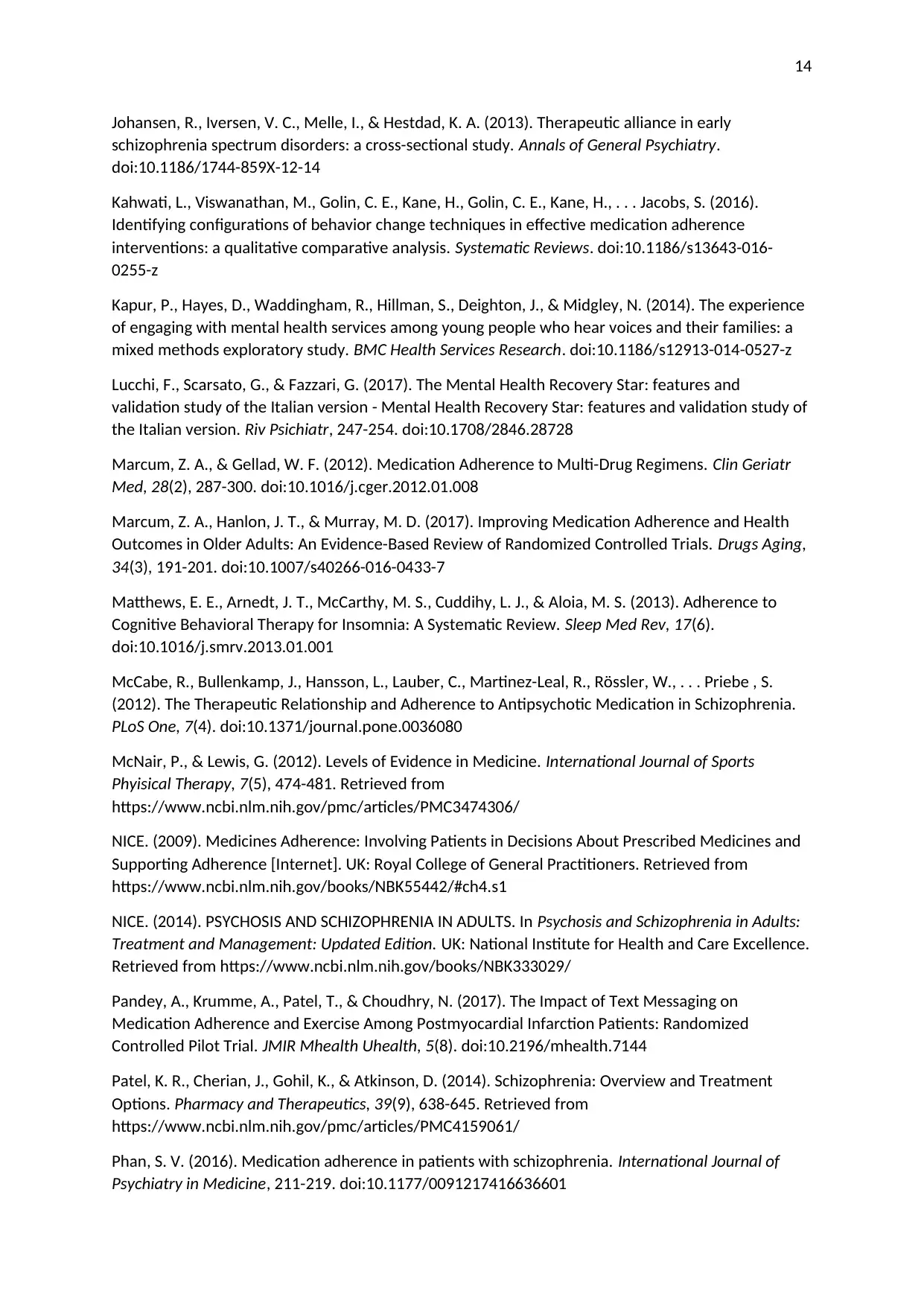
14
Johansen, R., Iversen, V. C., Melle, I., & Hestdad, K. A. (2013). Therapeutic alliance in early
schizophrenia spectrum disorders: a cross-sectional study. Annals of General Psychiatry.
doi:10.1186/1744-859X-12-14
Kahwati, L., Viswanathan, M., Golin, C. E., Kane, H., Golin, C. E., Kane, H., . . . Jacobs, S. (2016).
Identifying configurations of behavior change techniques in effective medication adherence
interventions: a qualitative comparative analysis. Systematic Reviews. doi:10.1186/s13643-016-
0255-z
Kapur, P., Hayes, D., Waddingham, R., Hillman, S., Deighton, J., & Midgley, N. (2014). The experience
of engaging with mental health services among young people who hear voices and their families: a
mixed methods exploratory study. BMC Health Services Research. doi:10.1186/s12913-014-0527-z
Lucchi, F., Scarsato, G., & Fazzari, G. (2017). The Mental Health Recovery Star: features and
validation study of the Italian version - Mental Health Recovery Star: features and validation study of
the Italian version. Riv Psichiatr, 247-254. doi:10.1708/2846.28728
Marcum, Z. A., & Gellad, W. F. (2012). Medication Adherence to Multi-Drug Regimens. Clin Geriatr
Med, 28(2), 287-300. doi:10.1016/j.cger.2012.01.008
Marcum, Z. A., Hanlon, J. T., & Murray, M. D. (2017). Improving Medication Adherence and Health
Outcomes in Older Adults: An Evidence-Based Review of Randomized Controlled Trials. Drugs Aging,
34(3), 191-201. doi:10.1007/s40266-016-0433-7
Matthews, E. E., Arnedt, J. T., McCarthy, M. S., Cuddihy, L. J., & Aloia, M. S. (2013). Adherence to
Cognitive Behavioral Therapy for Insomnia: A Systematic Review. Sleep Med Rev, 17(6).
doi:10.1016/j.smrv.2013.01.001
McCabe, R., Bullenkamp, J., Hansson, L., Lauber, C., Martinez-Leal, R., Rössler, W., . . . Priebe , S.
(2012). The Therapeutic Relationship and Adherence to Antipsychotic Medication in Schizophrenia.
PLoS One, 7(4). doi:10.1371/journal.pone.0036080
McNair, P., & Lewis, G. (2012). Levels of Evidence in Medicine. International Journal of Sports
Phyisical Therapy, 7(5), 474-481. Retrieved from
https://www.ncbi.nlm.nih.gov/pmc/articles/PMC3474306/
NICE. (2009). Medicines Adherence: Involving Patients in Decisions About Prescribed Medicines and
Supporting Adherence [Internet]. UK: Royal College of General Practitioners. Retrieved from
https://www.ncbi.nlm.nih.gov/books/NBK55442/#ch4.s1
NICE. (2014). PSYCHOSIS AND SCHIZOPHRENIA IN ADULTS. In Psychosis and Schizophrenia in Adults:
Treatment and Management: Updated Edition. UK: National Institute for Health and Care Excellence.
Retrieved from https://www.ncbi.nlm.nih.gov/books/NBK333029/
Pandey, A., Krumme, A., Patel, T., & Choudhry, N. (2017). The Impact of Text Messaging on
Medication Adherence and Exercise Among Postmyocardial Infarction Patients: Randomized
Controlled Pilot Trial. JMIR Mhealth Uhealth, 5(8). doi:10.2196/mhealth.7144
Patel, K. R., Cherian, J., Gohil, K., & Atkinson, D. (2014). Schizophrenia: Overview and Treatment
Options. Pharmacy and Therapeutics, 39(9), 638-645. Retrieved from
https://www.ncbi.nlm.nih.gov/pmc/articles/PMC4159061/
Phan, S. V. (2016). Medication adherence in patients with schizophrenia. International Journal of
Psychiatry in Medicine, 211-219. doi:10.1177/0091217416636601
Johansen, R., Iversen, V. C., Melle, I., & Hestdad, K. A. (2013). Therapeutic alliance in early
schizophrenia spectrum disorders: a cross-sectional study. Annals of General Psychiatry.
doi:10.1186/1744-859X-12-14
Kahwati, L., Viswanathan, M., Golin, C. E., Kane, H., Golin, C. E., Kane, H., . . . Jacobs, S. (2016).
Identifying configurations of behavior change techniques in effective medication adherence
interventions: a qualitative comparative analysis. Systematic Reviews. doi:10.1186/s13643-016-
0255-z
Kapur, P., Hayes, D., Waddingham, R., Hillman, S., Deighton, J., & Midgley, N. (2014). The experience
of engaging with mental health services among young people who hear voices and their families: a
mixed methods exploratory study. BMC Health Services Research. doi:10.1186/s12913-014-0527-z
Lucchi, F., Scarsato, G., & Fazzari, G. (2017). The Mental Health Recovery Star: features and
validation study of the Italian version - Mental Health Recovery Star: features and validation study of
the Italian version. Riv Psichiatr, 247-254. doi:10.1708/2846.28728
Marcum, Z. A., & Gellad, W. F. (2012). Medication Adherence to Multi-Drug Regimens. Clin Geriatr
Med, 28(2), 287-300. doi:10.1016/j.cger.2012.01.008
Marcum, Z. A., Hanlon, J. T., & Murray, M. D. (2017). Improving Medication Adherence and Health
Outcomes in Older Adults: An Evidence-Based Review of Randomized Controlled Trials. Drugs Aging,
34(3), 191-201. doi:10.1007/s40266-016-0433-7
Matthews, E. E., Arnedt, J. T., McCarthy, M. S., Cuddihy, L. J., & Aloia, M. S. (2013). Adherence to
Cognitive Behavioral Therapy for Insomnia: A Systematic Review. Sleep Med Rev, 17(6).
doi:10.1016/j.smrv.2013.01.001
McCabe, R., Bullenkamp, J., Hansson, L., Lauber, C., Martinez-Leal, R., Rössler, W., . . . Priebe , S.
(2012). The Therapeutic Relationship and Adherence to Antipsychotic Medication in Schizophrenia.
PLoS One, 7(4). doi:10.1371/journal.pone.0036080
McNair, P., & Lewis, G. (2012). Levels of Evidence in Medicine. International Journal of Sports
Phyisical Therapy, 7(5), 474-481. Retrieved from
https://www.ncbi.nlm.nih.gov/pmc/articles/PMC3474306/
NICE. (2009). Medicines Adherence: Involving Patients in Decisions About Prescribed Medicines and
Supporting Adherence [Internet]. UK: Royal College of General Practitioners. Retrieved from
https://www.ncbi.nlm.nih.gov/books/NBK55442/#ch4.s1
NICE. (2014). PSYCHOSIS AND SCHIZOPHRENIA IN ADULTS. In Psychosis and Schizophrenia in Adults:
Treatment and Management: Updated Edition. UK: National Institute for Health and Care Excellence.
Retrieved from https://www.ncbi.nlm.nih.gov/books/NBK333029/
Pandey, A., Krumme, A., Patel, T., & Choudhry, N. (2017). The Impact of Text Messaging on
Medication Adherence and Exercise Among Postmyocardial Infarction Patients: Randomized
Controlled Pilot Trial. JMIR Mhealth Uhealth, 5(8). doi:10.2196/mhealth.7144
Patel, K. R., Cherian, J., Gohil, K., & Atkinson, D. (2014). Schizophrenia: Overview and Treatment
Options. Pharmacy and Therapeutics, 39(9), 638-645. Retrieved from
https://www.ncbi.nlm.nih.gov/pmc/articles/PMC4159061/
Phan, S. V. (2016). Medication adherence in patients with schizophrenia. International Journal of
Psychiatry in Medicine, 211-219. doi:10.1177/0091217416636601
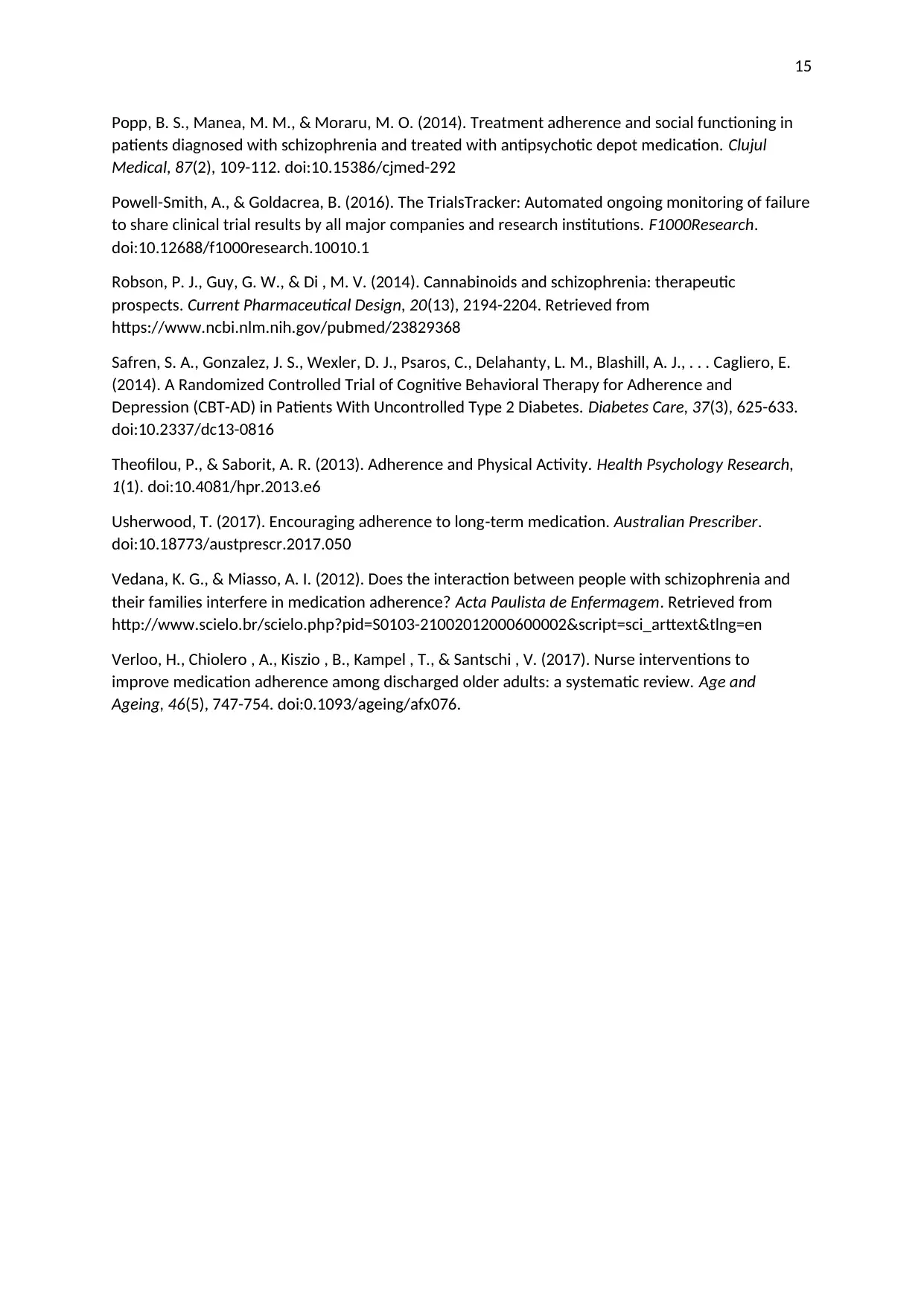
15
Popp, B. S., Manea, M. M., & Moraru, M. O. (2014). Treatment adherence and social functioning in
patients diagnosed with schizophrenia and treated with antipsychotic depot medication. Clujul
Medical, 87(2), 109-112. doi:10.15386/cjmed-292
Powell-Smith, A., & Goldacrea, B. (2016). The TrialsTracker: Automated ongoing monitoring of failure
to share clinical trial results by all major companies and research institutions. F1000Research.
doi:10.12688/f1000research.10010.1
Robson, P. J., Guy, G. W., & Di , M. V. (2014). Cannabinoids and schizophrenia: therapeutic
prospects. Current Pharmaceutical Design, 20(13), 2194-2204. Retrieved from
https://www.ncbi.nlm.nih.gov/pubmed/23829368
Safren, S. A., Gonzalez, J. S., Wexler, D. J., Psaros, C., Delahanty, L. M., Blashill, A. J., . . . Cagliero, E.
(2014). A Randomized Controlled Trial of Cognitive Behavioral Therapy for Adherence and
Depression (CBT-AD) in Patients With Uncontrolled Type 2 Diabetes. Diabetes Care, 37(3), 625-633.
doi:10.2337/dc13-0816
Theofilou, P., & Saborit, A. R. (2013). Adherence and Physical Activity. Health Psychology Research,
1(1). doi:10.4081/hpr.2013.e6
Usherwood, T. (2017). Encouraging adherence to long-term medication. Australian Prescriber.
doi:10.18773/austprescr.2017.050
Vedana, K. G., & Miasso, A. I. (2012). Does the interaction between people with schizophrenia and
their families interfere in medication adherence? Acta Paulista de Enfermagem. Retrieved from
http://www.scielo.br/scielo.php?pid=S0103-21002012000600002&script=sci_arttext&tlng=en
Verloo, H., Chiolero , A., Kiszio , B., Kampel , T., & Santschi , V. (2017). Nurse interventions to
improve medication adherence among discharged older adults: a systematic review. Age and
Ageing, 46(5), 747-754. doi:0.1093/ageing/afx076.
Popp, B. S., Manea, M. M., & Moraru, M. O. (2014). Treatment adherence and social functioning in
patients diagnosed with schizophrenia and treated with antipsychotic depot medication. Clujul
Medical, 87(2), 109-112. doi:10.15386/cjmed-292
Powell-Smith, A., & Goldacrea, B. (2016). The TrialsTracker: Automated ongoing monitoring of failure
to share clinical trial results by all major companies and research institutions. F1000Research.
doi:10.12688/f1000research.10010.1
Robson, P. J., Guy, G. W., & Di , M. V. (2014). Cannabinoids and schizophrenia: therapeutic
prospects. Current Pharmaceutical Design, 20(13), 2194-2204. Retrieved from
https://www.ncbi.nlm.nih.gov/pubmed/23829368
Safren, S. A., Gonzalez, J. S., Wexler, D. J., Psaros, C., Delahanty, L. M., Blashill, A. J., . . . Cagliero, E.
(2014). A Randomized Controlled Trial of Cognitive Behavioral Therapy for Adherence and
Depression (CBT-AD) in Patients With Uncontrolled Type 2 Diabetes. Diabetes Care, 37(3), 625-633.
doi:10.2337/dc13-0816
Theofilou, P., & Saborit, A. R. (2013). Adherence and Physical Activity. Health Psychology Research,
1(1). doi:10.4081/hpr.2013.e6
Usherwood, T. (2017). Encouraging adherence to long-term medication. Australian Prescriber.
doi:10.18773/austprescr.2017.050
Vedana, K. G., & Miasso, A. I. (2012). Does the interaction between people with schizophrenia and
their families interfere in medication adherence? Acta Paulista de Enfermagem. Retrieved from
http://www.scielo.br/scielo.php?pid=S0103-21002012000600002&script=sci_arttext&tlng=en
Verloo, H., Chiolero , A., Kiszio , B., Kampel , T., & Santschi , V. (2017). Nurse interventions to
improve medication adherence among discharged older adults: a systematic review. Age and
Ageing, 46(5), 747-754. doi:0.1093/ageing/afx076.
1 out of 16
Related Documents
Your All-in-One AI-Powered Toolkit for Academic Success.
+13062052269
info@desklib.com
Available 24*7 on WhatsApp / Email
![[object Object]](/_next/static/media/star-bottom.7253800d.svg)
Unlock your academic potential
© 2024 | Zucol Services PVT LTD | All rights reserved.





